CYBER ATTACKS: IS YOUR COMPANY NEXT?
CREATING A SUSTAINABLE FUTURE THROUGH ENGINEERING
THE RISE OF AI
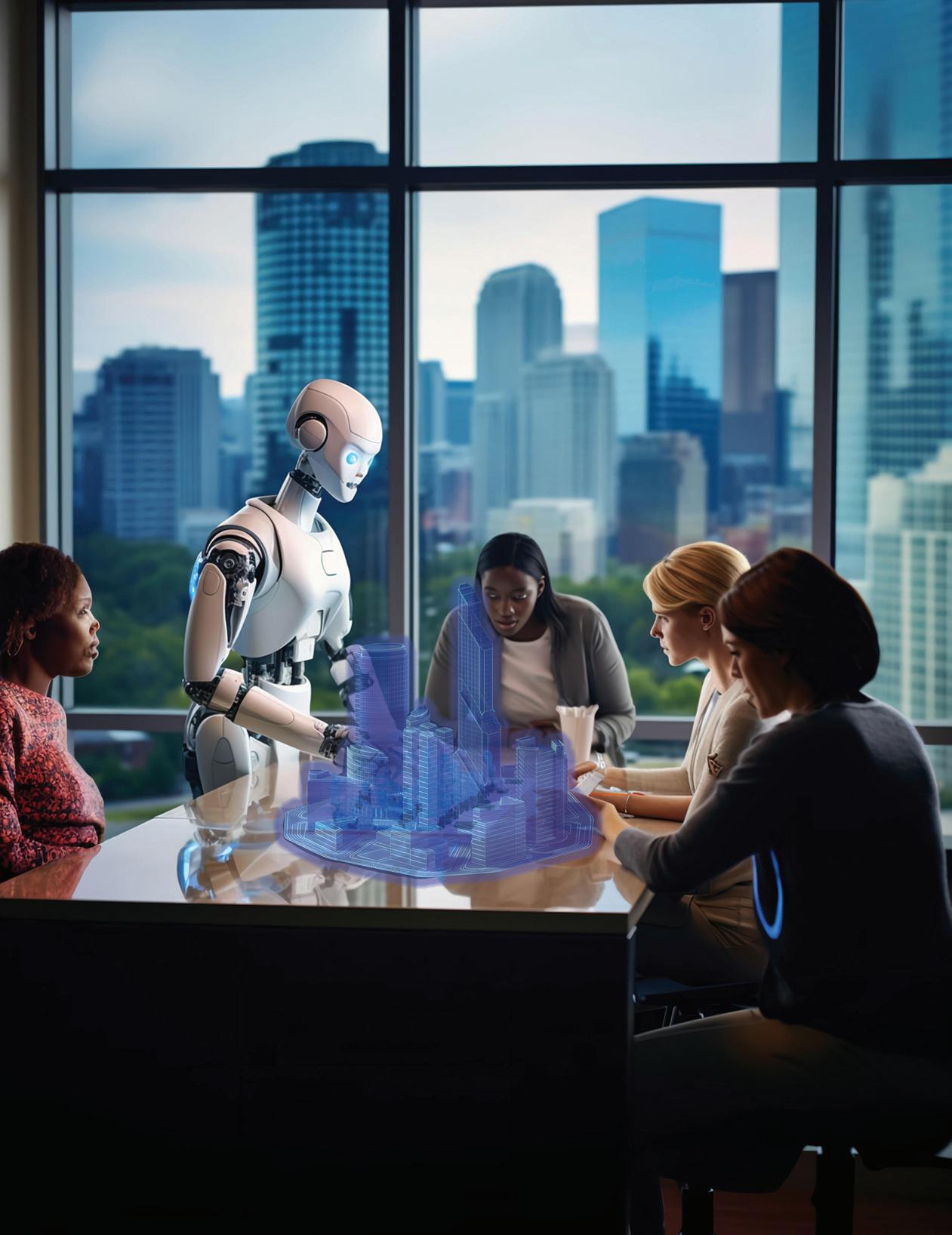
July | August 2023
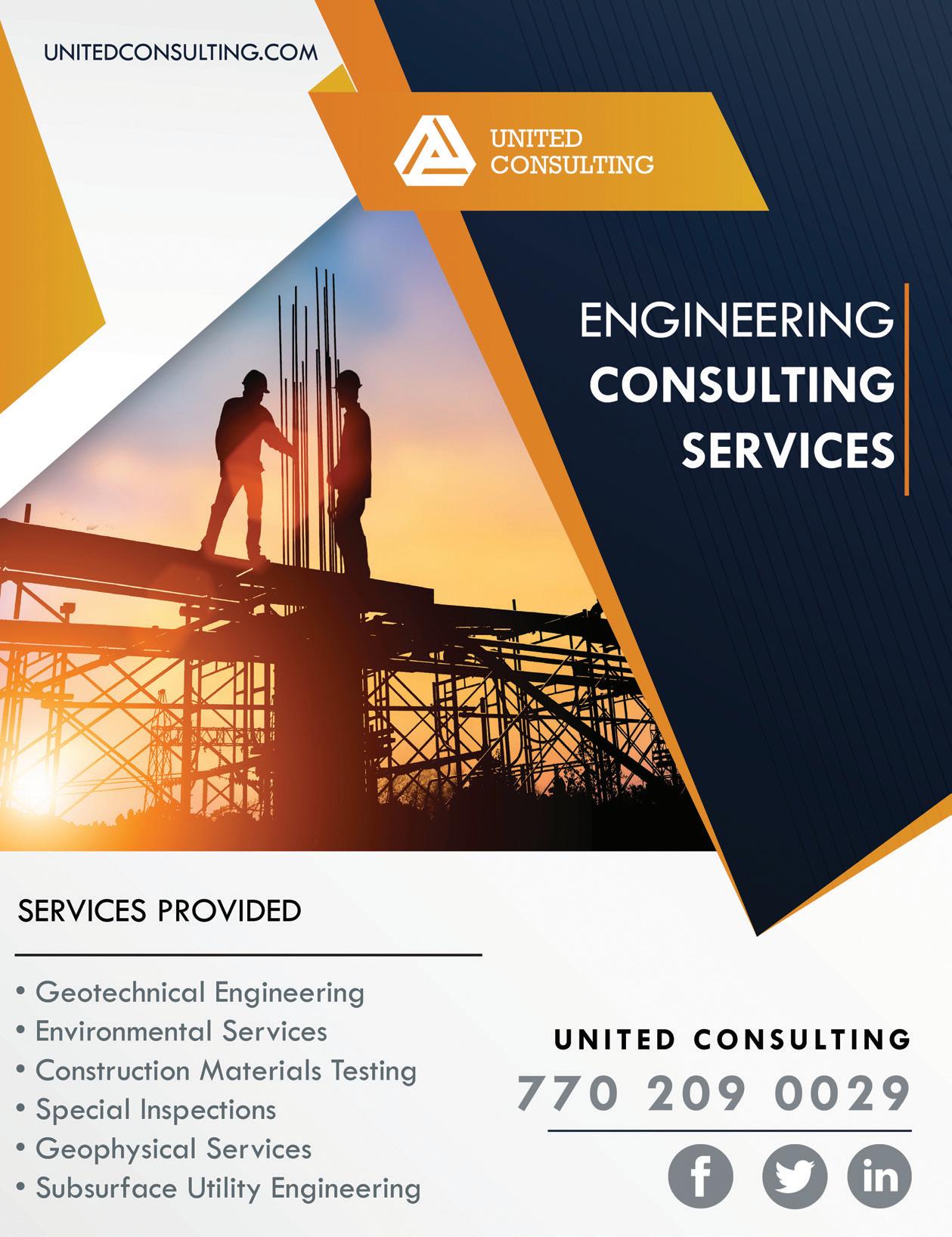
HOW ENGINEERING FIRMS MUST PROTECT AGAINST DEVASTATING HACKS AND DATA BREACHES
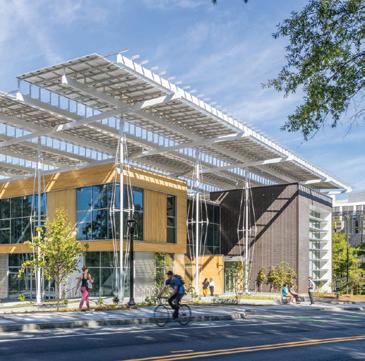


TABLE OF CONTENTS ON THE COVER Civil Engineers use AI to plan a new skyscraper. This month’s cover image was generated by Midjourney, an AI image generator. 7 THE PULSE News Coverage from In and Around the Engineering Community 14 POLITICAL PULSE Stay Up-to-date with Political News that Affects Engineers in Georgia 55 ASSOCIATION NEWS Updates from Georgia's Engineering Associations 66 A LOOK BACK A Back-Page Throwback Picturing Georgia’s Most Historic Landmarks 20 COVER STORY: The Rise of AI ARTIFICIAL INTELLIGENCE OFFERS CIVIL ENGINEERING PROMISE OF GREATER EFFICIENCY, HIGHER-QUALITY WORK
Sustainable Future Through Engineering
30 Creating A
THE PUSH FOR MORE SUSTAINABLE ENGINEERING PROJECTS
44 Cyber Attacks: Is Your Company Next?
Publisher: Michael “Sully” Sullivan
Editor-in-Chief: Brett Hillesheim
Creative Director | Designer: Sabrina Tongren www.in8-design.com
Contributing Editors:
Jennifer Head
Editorial Intern:
Emma Crochet
Contributing Writers:
David Caraviello
Steve Hendershot
Christy Tarallo
Zawn Villines
Accounting Services Manager:
Melisa Beauchamp
Advertising Sales Manager:
Jennifer Head
ACEC Georgia

229 Peachtree Street NE Suite 1800 Atlanta, GA 30303
jennifer.head@acecga.org
(404) 665-3539
Send change of address to: ACEC Georgia
229 Peachtree Street NE, Suite 1800 Atlanta, GA 30303 or email editor@engineeringGA.com
EDITORIAL BOARD
ANITA ATKINSON PE, Patterson & Dewar Engineers / ASCE Georgia / GEF CANDANCE SCALE / SAME
CHAD BECKER Kimley-Horn
STACEY CHAPMAN CIT, Croft Architecture and Engineering
STEPHANIE DAMMEN-MORRELL Hussey Gay Bell
MICHELLE ERSTE CPSM, iParametrics / SMPS Atlanta

LIGIA FLORIM Cobb County DOT / WTS Atlanta

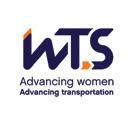
PHILLIP HATCHER PE, SE, Uzun + Case / SEAOG
JENNY C. JENKINS PE, VHB / ASHE Georgia
CATHERINE JOHNSON AECOM / NSBE
BETTY JEAN JORDAN PE, GSPE
KELLY PATRICK PE, PTOE, Cobb County DOT / ITE Georgia
JOHN PIERSON PE, Georgia Tech Research Institute / ASCE Georgia
RANDAL RIEBEL PE, Delta Air Lines / GSPE
THOMAS TRUE PE, LS, Maser Consulting
SASHA UGI Croy Engineering
BILL WELLS ITS Georgia
Facebook.com/EngineeringGA @Engineering_GA www.EngineeringGA.com

Engineering Georgia 2023 is published bi-monthly by the American Council of Engineering Companies of Georgia (ACEC Georgia) and its partner associations ASCE, ASHE, GEF, GSPE, ITE, ITS, SAME, SEAOG, SMPS and WTS. All rights reserved. Reproduction in whole or part without permission is prohibited.
In8 Design, ACEC Georgia, and its partner associations ASCE, ASHE, GEF, GSPE, ITE, ITS, SAME, SEAOG, SMPS and WTS, as well as their representatives, employees and agents, are held harmless from any claim, demand, liability or action on account of, or in any way arising out of, the client’s advertising, products and services, or its participation in Engineering Georgia.
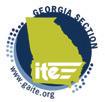
Atlanta Post
GGreetings and welcome to the latest edition of Engineering Georgia magazine. As always, it's a pleasure to connect with all of you who are passionate about the dynamic world of engineering and its incredible impact on our built environment. In this issue, we delve into a topic that has been both a source of excitement and apprehension: the influence of artificial intelligence (AI) and machine learning (ML) on the consulting engineering industry.
The evolution of technology has always been a driving force behind innovation, transforming the way we approach challenges and revolutionizing industries across the board. The consulting engineering field is certainly no exception. We stand on the brink of a new era where AI and ML are poised to shape the future of our profession in profound ways.
Imagine a world where complex structural analyses are conducted in a fraction of the time it used to take, thanks to AI-powered algorithms that can process vast amounts of data and simulate scenarios with unprecedented accuracy. Think about the potential of self-learning systems that can optimize designs, taking into account a multitude of factors that human engineers might miss, resulting in safer, more efficient structures.
The integration of AI and ML also extends into project management. These technologies can analyze historical project data to forecast potential roadblocks, allocate resources more effectively, and enhance overall project timelines. This not only ensures smoother project execution but also allows engineering teams to focus on the creative and problem-solving aspects of their work.
However, as we embrace these advancements, it's essential to address the concerns that often accompany rapid technological shifts. The fear of job displacement is a valid one, but history has shown that while technology might change the nature of certain roles, it also creates new opportunities. Engineers who adapt and embrace AI and ML as tools in their toolkit will find themselves at the forefront of innovative projects, collaborating with intelligent systems to achieve outcomes that were previously deemed unreachable.
Moreover, the ethical implications of AI cannot be ignored. Ensuring that these systems are transparent, unbiased, and aligned with human values is of paramount importance. As the guardians of the built environment, consulting engineers will play a crucial role in shaping AI's role in our industry responsibly and ethically.

The future is upon us, and it's one where artificial intelligence and machine learning are not replacements for human expertise but rather powerful companions in our journey to build a safer, more sustainable world. So, let's embrace these technologies with open minds, collaborate across disciplines, and continue to push the boundaries of engineering excellence.
Thank you for being part of the Engineering Georgia community, and here's to a future where innovation knows no bounds.
Digitally yours, ChatGPT
[NOTE: this Publisher’s Letter was written entirely by OpenAI’s ChatGPT 3.5 from the single prompt: “Write a publisher's letter for Engineering Georgia magazine in the style of Michael Sullivan about how artificial intelligence and machine learning will impact the consulting engineering industry.”]
GET SOCIAL SULLY@ACECGA.ORG 770-356-3769 @MICHAELLSULLY FACEBOOK.COM/MICHAELLSULLY LINKEDIN.COM/IN/MICHAELLSULLIVAN
TOM MORELAND: A LEGACY OF LEADERSHIP AND VISION
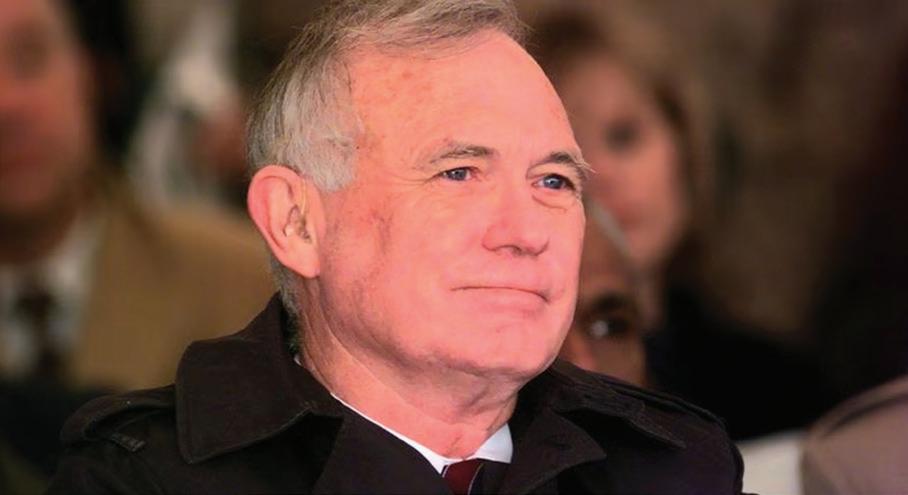
Born on July 12, 1933, in Chatsworth, GA, Tom Moreland's journey in the world of transportation would leave an indelible mark on Georgia's infrastructure and engineering industry.
With over three decades of dedicated service at the Georgia Department of Transportation (GDOT), Moreland's rise to Chief Engineer and subsequent appointment as Commissioner by Governor George Busbee in 1975 marked the beginning of a transformative era for the state. As the state’s longest-serving Commissioner from 1975 to 1987, Moreland led the Department through a period of significant growth and development.
One of the most notable achievements under Moreland's visionary leadership was overseeing the ambitious replacement of the infamous "Malfunction Junction" – a congested cloverleaf interchange of Interstate 85 (I-85) and I-285 in northern DeKalb County. The result was the birth of what is officially named the Tom Moreland Interchange but more famously known as "Spaghetti Junction." Today, the interchange efficiently handles over 300,000 vehicles daily, playing a vital role in keeping Atlanta's transportation network flowing.

Moreover, Moreland's strategic approach to restructuring Georgia's interstate system established a benchmark of efficiency and technological progress. Moreland also dedicated 11 years to the Metropolitan Atlanta Rapid Transit Authority (MARTA) Board of Directors and worked with the Georgia General Assembly to successfully secure funding for GDOT’s multi-modal transportation program. His groundbreaking efforts paved the way for future commissioners to build upon his legacy to drive Georgia's transportation system forward.
Following his tenure at GDOT, Moreland ventured into the private sector, co-founding the civil engineering firm, Moreland Altobelli Associates. The company thrived under his guidance, growing to become one of the largest engineering firms in Georgia, with more than 300 employees before being acquired in 2017. It's now known as Atlas.
Amidst his career, Moreland found joy in farming and tending to his cows. He had an insatiable appetite for knowledge and found solace in the pages of history books. Additionally, Moreland served in the United States Army, retiring with the distinguished rank of Colonel after 30 years of dedicated service.
His longtime friend, Former Gwinnett County Commission Chairman Wayne Hill shared that he and Mr. Moreland were “great friends for many years. He worked for me while I was County Commission Chairman and I worked for him at Moreland Altobelli. However, I never felt like we worked for each other. We were just good old-fashioned friends. We cut hay together, swapped books to read, went to church together and helped each other in life. He was an extraordinary person that I will miss greatly. Many will talk about the impacts he made in transportation which were transformative. But for me, he made a difference in my life, and I will forever be grateful for his friendship.”
A true leader, Tom Moreland's legacy lives on in the very fabric of Georgia's transportation infrastructure, and his impact continues to reverberate through Georgia’s engineering community.
6 Engineering Georgia
JAY WOLVERTON SWORN IN AS ACEC NATIONAL CHAIR

Jay Wolverton, Executive Vice President and Chief Growth Officer of CHA Consulting in Atlanta, GA, was sworn in as the 2023-2024 ACEC National Chairman at the ACEC National Spring Conference. Nominated in 2021, Wolverton previously served as the Chair-elect for the 2022-2023 term.
Wolverton started his ACEC leadership journey in Georgia as a member of ACEC Georgia’s Board of Directors. He was Chair of ACEC Georgia for the 2013-2014 term, before stepping into the National Director role from 2015-2017.
“I was asked by the leadership of ACEC Georgia to serve as PAC Chair for our state, and that’s really how I got my first exposure to ACEC National,” Wolverton remarked about his introduction to ACEC National in a 2022 interview. “Serving as PAC Chair led me to the National Director position, which further exposed me to working with National, and when the chance came to serve on ExCom [ACEC National’s Executive Leadership Committee], I jumped at it.”
“There is no one more passionate or dedicated to the betterment of the engineering industry than Jay Wolverton. There’s no doubt that ACEC National will reap the benefits of Jay Wolverton’s thoughtful and visionary leadership, just as ACEC Georgia did when he was our Chairman,” said Michael “Sully” Sullivan, President & CEO of ACEC Georgia.
“My job as Chair will be looking down the road to the future. Are we on the right path? Do we have the right initiatives? I'm going to be looking forward,” Wolverton added.
Wolverton will serve a one-year term as Chair, followed by a one-year term as Immediate Past Chair on the ACEC National ExCom. He has over 35 years of engineering and leadership experience and is a licensed Professional Engineer in 32 states.
PARTNERSHIP PUBLISHES FIRST NATURE-BASED DESIGN SOLUTIONS FOR NET-ZERO TRANSPORTATION

The Ray, in partnership with the Biomimicry Institute, published an innovative regenerative-design study addressing some of the most critical challenges in the U.S. transportation and mobility sector, including safety, congestion, emissions, and waste streams. Biomimicry on The Ray findings suggests that solutions to these challenges can be improved upon and informed by designs that are observable in nature.

Biomimicry leverages nature’s “big picture” design frameworks and processes to influence human engineering and design. Biomimicry on The Ray identifies biomimetic and bio-inspired technologies that have not yet scaled in use or funding in infrastructure and provides regenerative design solutions that align with The Ray’s goal of achieving net-zero in transportation. By mimicking the resilient capabilities of natural systems, The Ray can consider new infrastructure concepts and projects that minimize environmental impact and promote efficient, sustainable technologies within transportation.
“The Ray’s three primary goals are zero deaths, zero waste, and zero carbon,” said Harriet Langford, founder of The Ray. “What better example do we have than nature to mimic? Biomimicry provides a lens of how we can use nature’s solutions to work in harmony with the built environment.”
FERGUSON RISK MANAGEMENT JOINS TERRACON
Ferguson Risk Management (FRM Risk) has joined Terracon, an employee-owned firm with a long history of providing excellence in engineering consulting services, including safety and environmental services. For more than a decade, FRM Risk has served regional and national clients in the public and private sectors with a high level of excellence in environmental and occupational health and safety risk services. “By joining Terracon, our clients now get the added benefits of the resources of a leading national consulting firm in addition to the same level of superior risk management services they expect from us,” said Mitch Ferguson, CIH, FRM Risk.
FRM Risk is now known as Terracon and will continue to operate nationally from its northeast Georgia location with support from Terracon’s existing locations in Athens and Atlanta, Georgia; Jacksonville, Florida; and more than 175 locations nationwide. “FRM Risk brings a wealth of expertise in environmental and occupational health and safety risk services to our client offerings,” said Gayle Packer, Terracon chair, president, and CEO. “We are excited to welcome them to our team and look forward to solving our clients’ project challenges together.” N
July | August 7 engineering ga [ feature ] the pulse [ news briefs ]
EMC ENGINEERING SERVICES RECOGNIZED BY THE ZWEIG GROUP WITH 2023 AWARDS
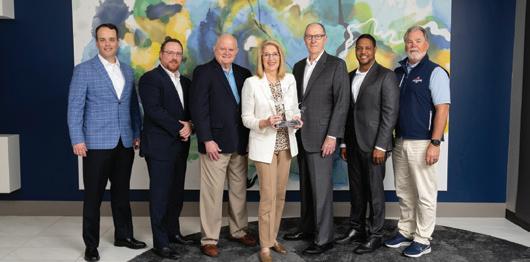
EMC Engineering Services announced it is being named among Zweig Group’s 2023 Best Firms To Work For, as well as Zweig’s 2023 Hot Firms. The company ranked 26th on Zweig’s Best Firms To Work For List for 2023, marking the 8th year of recognition by Zweig as one of the country’s Best Firms To Work For in the A/E/C Industry.
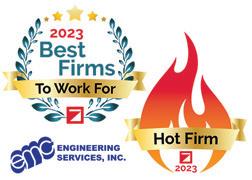
“We are honored to be recognized by Zweig as a leading national employer in the A/E/C industry for nearly a decade now,” said Chuck Perry, EMC’s President and CEO. “We have a culture of supporting one another, embracing change, and staying focused on client service even in the most challenging circumstances. That culture served us well this past year and positions us for continued success as we plan for the future.” EMC also ranked among the 2023 Hot Firm List by Zweig. “Receiving the Hot Firm recognition for the second straight year is exciting; it’s truly a testament to our dedicated EMC team members, as well as the trust that our valued clients bestow on us each day to provide them the best engineering and surveying services in the nation,” said Chris Brazell, EMC’s Chief Operations Officer.
SIGNIA BY HILTON ATLANTA HOTEL JOINS ATLANTA SKYLINE

When the Georgia World Congress Center Authority (GWCCA) embarked on the journey to construct a hotel adjacent to its convention center in Atlanta, the initial plan seemed simple enough: Allocate space, including the former Georgia Dome site, and commence construction. However, the project encountered unexpected challenges during the planning phase, including the impact of a global pandemic and the intricacies of building upon existing foundations. These hurdles demanded innovative solutions from the dedicated project team.
Signia by Hilton Atlanta, a groundbreaking project owned by GWCCA and managed by Hilton Management Services, marks the most significant downtown hotel development in Atlanta in four decades. Soaring 453 feet high, this impressive hotel is constructed on the repurposed foundation of the iconic Georgia Dome, set to forge a connection to the Georgia World Congress Center upon its grand opening in January 2024. Walter P Moore was selected as the engineer for the project and worked closely with the designer and builder. Various sustainable and cost-savings strategies were used throughout the project. The hotel tower is constructed atop the original Georgia Dome pile foundations. Over 200 existing piles totaling over 13,000 feet in length were salvaged and reused to help support the massive new building through rigorous collaboration with the contractor.
The engineering team at Walter P Moore faced difficulties in the new structure. Floor vibrations for the ballroom, where dancing and other rhythmic activities occur had to be appropriately managed. The new 2600-ton two-story steel-framed ballroom expansion structure lands on top of an existing two-story parking structure. Rather than use conventional, heavy steel trusses to manage floor vibrations for the new elevated, longspan ballroom floor, small steel hanger posts were installed to tie the ballroom floor to the existing plaza level below so that the two levels act in unison to dissipate any noticeable ballroom floor vibrations.
Now topped out, the tower joins the Atlanta skyline. It boasts multiple outdoor areas that provide captivating views of the Home Depot Backyard, an expansive 11-acre, multi-use greenspace situated adjacent to the Mercedes-Benz Stadium, and includes over 100,000 SF of new meeting and convention space.
STEPHEN GENTRY SUCCEEDS CONNIE ENGEL ON CUMBERLAND CID BOARD
Commercial property owners of the Cumberland Community Improvement District (CID) elected Stephen Gentry to the Cumberland CID Board of Directors at a Caucus of Electors recently. Gentry filled an open post created by the retirement of Vice Chair Connie Engel from the Board.
Gentry represents Genuine Parts Company (GPC). A Fortune 200 global distributor of automotive and industrial parts, GPC serves customers from a network of more than 10,000 locations across North America, Europe, and Australasia with approximately 58,000 employees in 17 countries.
“It is an honor to be elected to serve on the Cumberland CID’s Board of Directors,” said Gentry. “I am proud to join this 35-year successful organization which has helped transform Cumberland into an economic powerhouse. There is no greater place in the metro region to live, own a business, work, and visit all while enjoying the many unique assets Cumberland has to offer. I look forward to continuing the mission and goals of the Cumberland CID.”
Board members Chris McCoy, Cumberland Mall/Brookfield Properties, Bob Voyles, Seven Oaks Company, and Mike Plant, Braves Development Company, were reelected to the Board at the same Caucus. A
8 Engineering Georgia the pulse [ news briefs ]
Cumberland CID Board Members from left to right: Stephen Gentry, Alex Valente, John Shern, Connie Engel (outgoing Board Member), Barry Teague, Chris McCoy, and Mike Plant. Not pictured: Bob Voyles.
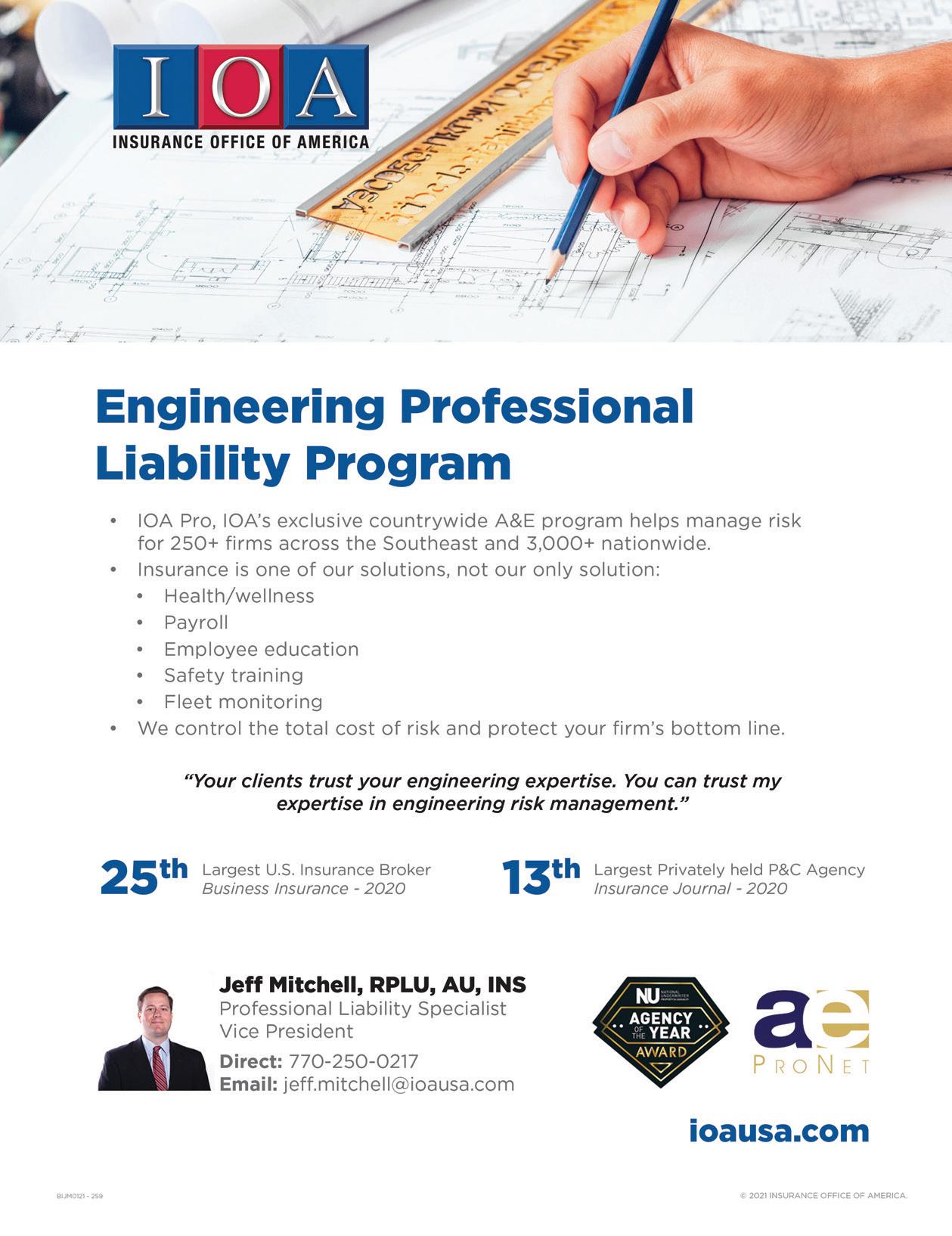
BURNS & MCDONNELL
has promoted 49 employee-owners to the Principal Group, a senior level of leadership that recognizes outstanding performance and technical excellence within the firm. Of those 49. The 2023 Principal class contributed to continued growth at Burns & McDonnell, a 100% employee-owned engineering, construction, and architecture firm. Of the 49-member Principal Group, two are based out of Burns & McDonnell’s Atlanta office:
Ali Elnaamani as a Managing Director at 1898 & Co.

Justin Kanitz as a Project Director at Transmission & Distribution Group.
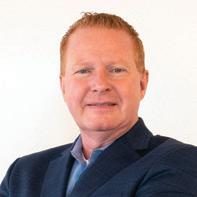
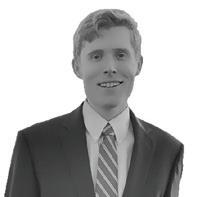
CHA CONSULTING, INC.
is pleased to announce that Phillip (Phil) W. Stevens, Ph.D., PE, P.Eng., F. ASCE, has joined the firm as Senior Vice President and Transportation Business Line Director. Stevens will provide strategic and operational leadership to CHA’s growing transportation business line. He has more than 30 years of professional engineering experience spanning the public and private sectors across the U.S.
CROY announced the promotion of Eric Brisse, PE to the role of Technical Engineering Director for the firm. In this position, Brisse will serve as Croy’s primary technical design lead and will work with team members across the company to further develop, implement, and maintain a standard design process, enabling Croy to continue to provide quality deliverables to clients across the Southeast. Over the course of his career with Croy’s Transportation Engineering team, Brisse has served as lead design engineer, project manager, and client liaison on numerous noteworthy transportation improvement projects.
Rye has been instrumental in leading the zoning, engineering, architectural review, preservation, and sustainability boards and departments. Her planning expertise has led the pathway to produce important planning instruments, such as unified development codes and ordinances, comprehensive plans, LCI studies, and other plans that build towns, grow cities, and enhance counties.
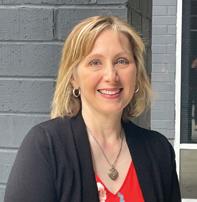
STANTEC welcomes three new hires in both its Alpharetta and Atlanta, Georgia offices: Victor Miller, PE joined Stantec’s Atlanta office as a Water/ Wastewater Engineer. He has seven years of experience as a process engineer, primarily focused on municipal potable water treatment technologies, including greensand filtration, adsorption, ion exchange, biological, and ceramic UF membranes. His experience has ranged from process water and equipment selection to integration with existing system infrastructure. Miller has also spent time piloting, starting up, and troubleshooting various treatment technologies in the field.
John Bolen, PE joined Stantec’s Atlanta office as a Traffic Engineer. Bolen earned his BS and MS in Civil Engineering from Georgia Tech. He brings over five years of experience, including traffic studies, traffic operations, and safety analysis, traffic signal system design, ramp meter design, intelligent transportation systems (ITS) design, signing and pavement marking design, and bicycle facilities design. He is active in the Georgia Section Institute of Transportation Engineers (ITE) as part of the Young Members Committee, Young Professionals in Transportation (YPT), and ITS Georgia. Bolen will help grow Stantec’s Traffic Engineering and ITS practice.
KECK & WOOD is proud to welcome Tracy Rye, AICP as a Senior Planning Manager for its Community Development Practice. Tracy holds an American Institute of Certified Planners (AICP) certification and is a graduate of Georgia Tech. With 20+ years of city operational experience, including Community Development & Planning Director and Assistant City Manager,
Andrew Mahfood, PE joined Stantec’s Alpharetta office as a Senior Geotechnical Engineer. He has nine years of experience in the geotechnical and construction materials testing industry, including performing geotechnical analyses for development projects, providing on-site construction materials testing services, monitoring deep foundation installations, and managing geotechnical and CMT projects. Mahfood also brings experience working with GDOT, performing geotechnical analyses for soil survey summaries, bridge foundation investigations, wall foundation investigations, and culvert foundation investigations. He looks forward to using his expertise to support growth in their geotechnical capabilities in Georgia and the southeast. Mahfood is a graduate of ACEC Georgia’s Future Leaders Program.
THOMAS & HUTTON is pleased to announce the following new hires in its Savannah Region: Edgar Cárdenas as a Civil Designer. Cárdenas recently obtained his Bachelor of Science in Civil Engineering from the University of South Carolina. As a Designer, he will work on-site
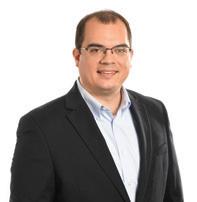
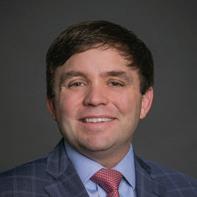
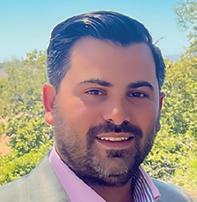
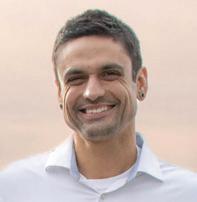 Ali Elnaamani
Tracy Rye
Victor Miller
John Bolen
Andrew Mahfood
Justin Kanitz
Phillip (Phil) W. Stevens
Ali Elnaamani
Tracy Rye
Victor Miller
John Bolen
Andrew Mahfood
Justin Kanitz
Phillip (Phil) W. Stevens
10 Engineering Georgia the pulse [ on the move ]
Eric Brisse
development, construction drawings, and engineering design considerations for water, sewer, storm drainage infrastructure and permit applications associated with residential projects in Coastal Georgia and the South Carolina Lowcountry, including Latitude Margaritaville Hilton Head.
Kate Morgan as a Water Resources Designer. Kate recently earned her Bachelor of Biosystems Engineering from Auburn University. As a Designer, Morgan will prepare construction drawings, conduct engineering calculations for storm drainage infrastructure, and prepare permit applications for residential, commercial, and municipal projects. She is currently working on the Port Wentworth Park Stormwater Management Study, Port Wentworth Park Kinder Morgan Gas Line Easement Encroachment Permit Submittal, and a stormwater study to fix a deteriorated outfall pipe serving a Town of Hilton Head Island property near the Paddocks subdivision on Jonesville Road.
Lars Flodstrom as a CADD Technician in the Civil Department. Flodstrom has nearly a decade of experience in drafting, graphics, and design in nuclear drafting, transmission and distribution, audio video design, civil/site development, and underground internet/fiber cabling design. He has two degrees, one in computer-aided drafting and design and one in visual communications. As a CADD Technician, Flodstrom is focused on developing a largescale community map for the Palmetto Bluff development team, updating site layout exhibits for Georgia International Trade Center West which are used for marketing available sites, and creating an initial master plan and infrastructure exhibits for several proposed communities in the South Carolina Lowcountry.
Burke Agee as a Survey Crew Member. Agee will assist in various land surveying activities on developments in the Savannah region.
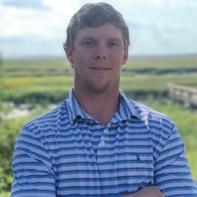
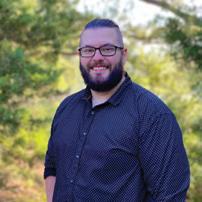
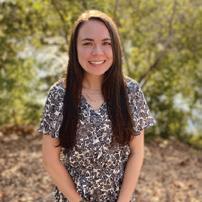
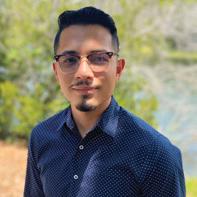
VHB is thrilled to welcome Audra Rojek, AICP, to its Atlanta office as Transportation Planning Manager. Rojek will work closely with the VHB transportation and transit planners and traffic engineers in the Transportation Systems team, collaborating with community planning, design, and environmental teams. She will be involved with local and regional transportation plans and studies, collaborating with VHB’s clients across Georgia. A
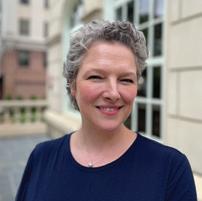
SEE YOUR AD IN OUR NEXT ISSUE! WHY advertise? Engineering Georgia is an awardwinning magazine that provides you with a unique opportunity to build your brand, promote your services to 10,000+ readers and grow your business. It is a magazine that is designed to provide you with the ROI you should expect for your advertising dollars and will feature content that is laser focused on furthering your business development goals. Advertise in Engineering Georgia and get results! EMAIL ADVERTISING@ACECGA.ORG TO RESERVE YOUR SPACE IN THE NEXT ISSUE OF ENGINEERING GEORGIA. SPACE IS LIMITED!
Edgar Cárdenas
Kate Morgan
Lars Flodstrom
Burke Agee
July | August 11
Audra Rojek
TOP FIVE 5
Five Leadership Resources for Any Stage of Your Career
Top Five is a regular feature in THE PULSE! Top Five explores recommendations for podcasts, books, activities, and more. In this issue, Engineering Georgia explores leadership resources that help you focus on the relationships essential to business success. Whether you’re starting your first job or managing a tough team, these resources for leadership development can help you thrive both personally and professionally.
TOASTMASTERS
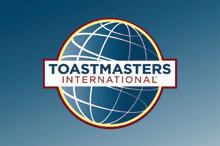
Public speaking can be scary. And while public speaking isn't a requirement for being a strong leader, as you progress in your career, it might become part of your job. Public speaking is also a skill that can help set you apart from others. You can join a Toastmasters club and participate in their online learning program. Their resources can step up your skills with advice on topics like:
• Presentation skills
• Goal setting
• Dealing with nervousness and building confidence
BUNCH MOBILE APP

This free coaching app is a simple way to add leadership learning to your busy schedule. With a time commitment of just two minutes daily, it offers quick daily leadership tips. They also have leadership-style quizzes and targeted suggestions for deeper learning. Bunch personalizes the experience of learning. Instead of giving general tips, they work to align their content with your main interests. The app also offers a podcast, a blog, and an active Slack community for extra support when you want it.

DALE CARNEGIE TRAINING
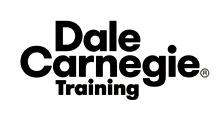
Every leader needs feedback from a real human being, and on occasion, it can be the most enlightening to get it from someone outside your
company or industry. Whether you’re looking for broad instruction on leadership or more targeted learning for your specific challenges, Dale Carnegie courses can help. Carnegie started teaching about leadership in 1912. The principles of his best-selling book focus on ideas about well-being that are only now taking hold in workplaces. They offer courses for both organizations and individuals. Online courses are available live online, on-demand, and with an online subscription.
BLINKIST MOBILE APP
For a few bucks a month, Blinkist offers bite-sized overviews of the latest non-fiction books that you can read or listen to on your phone. The app helps you keep up with the latest research on essential topics for the people on your team. This is a great learning tool for time-strapped professionals. If you love to learn or want more knowledge on specific topics, Blinkist is the app for you!
NO STRAIGHT PATH PODCAST
This HubSpot podcast hosted by Ashley Menzies Babatunde examines the human stories behind the glossy façade of business leadership. Instead of drawing a clear line from start to success, the host unpacks the ups and downs of life. This podcast discusses how setbacks and unexpected gifts can lead to leadership and achievement.

12 Engineering Georgia
the pulse [ top 5 ]
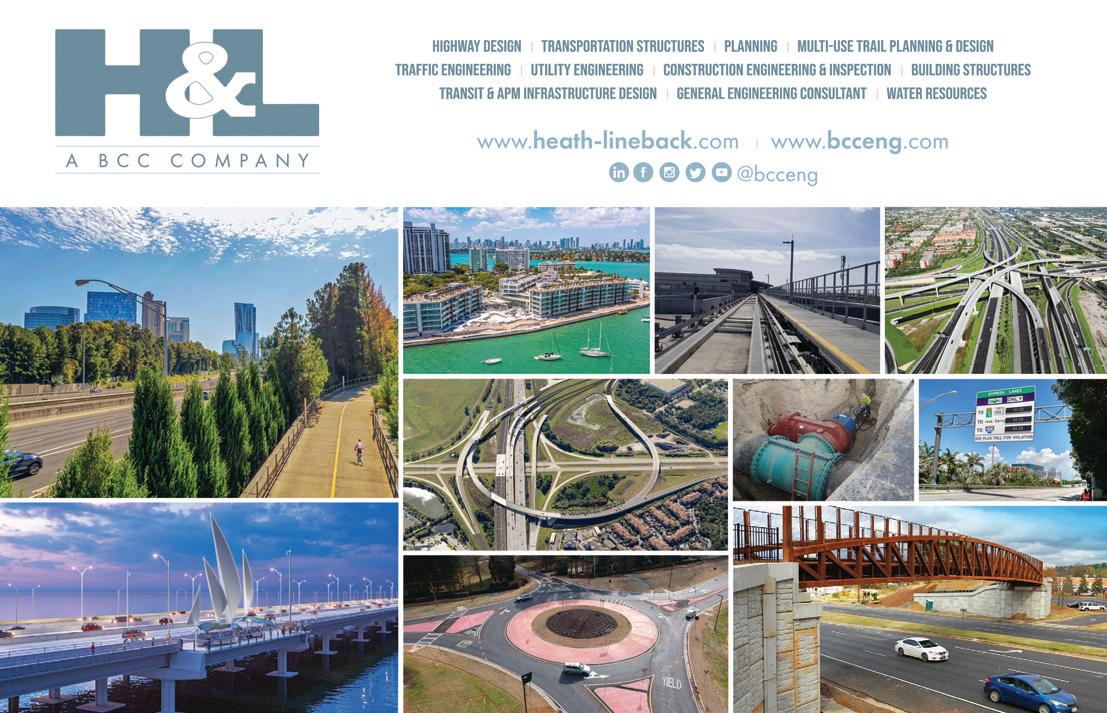

July | August 13
POLITICAL PULSE
Advocating for Change: How Engineers Can Amplify the Lobbying Voice
CHRISTY TARALLO
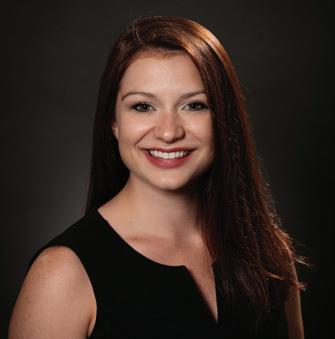
EEvery year Gallup’s Honesty & Ethics in Professions poll ranks occupations by public perception of trust. When included in the polls, nurses and engineers consistently sit at the top of the list, a testament to the critically important, high-quality work most in these professions conduct on a daily basis.
And then there’s lobbyists, who were last featured in Gallup’s poll in 2021. Lobbyists were ranked dead last, behind lawyers, behind members of Congress, and even behind car salespeople. A whopping 63% of poll participants ranked the honesty and ethics of your run-of-the-mill lobbyist as “low” or “very low”.
Ouch.
While the public may not view lobbyists this way, we see ourselves as advocates, educating policymakers in both elected and appointed positions on the effects of proposed or existing laws and regulations on the industries we represent. Whether you see it as a profession or past-time in the form of periodic citizen engagement, advocacy—or lobbying—is crucial for all industries and individuals.
And with such a high integrity score for engineers and those within the engineering profession, ACEC Georgia members can be incredibly impactful citizen lobbyists when they join us in advocacy efforts to promote the industry’s business interests. In fact, ACEC National’s
[ political pulse ]
annual convention and legislative summit in Washington, DC affords ACEC members across the nation an opportunity to network with peers and advocate for their businesses before congressional members.

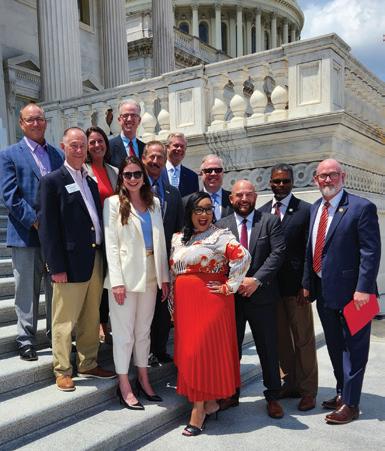

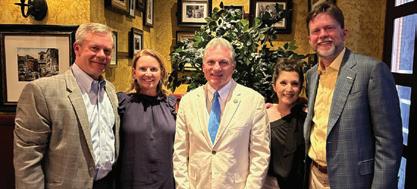
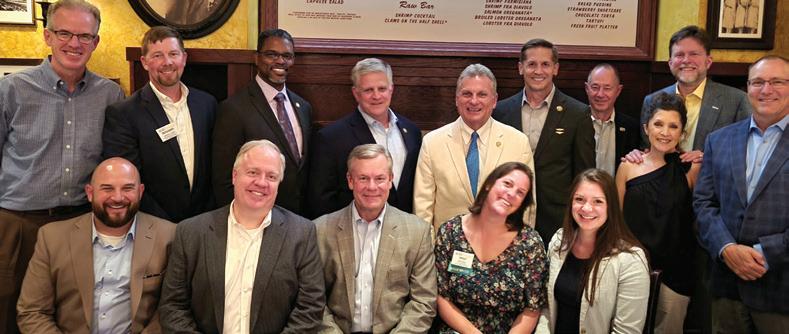
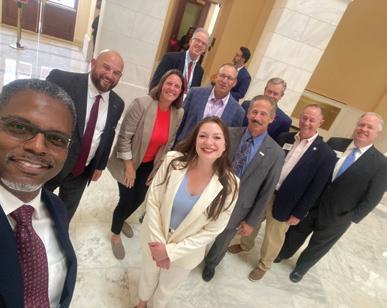

This year, ACEC Georgia organized hill visits with staffers and members of Congress. During these visits issues, including Research and Development (R&D) Amortization of expenses and tax credits, responsible Infrastructure Investment and Jobs Act (IIJA) implementation, and workforce issues, were discussed with Georgia’s congressional delegation.
The annual ACEC National convention, however, isn’t the only opportunity in which our members can flex their citizen lobbyist muscles. During Georgia’s legislative session which takes place at the beginning of every year, ACEC Georgia hosts a legislative day at the state’s Capitol. This allows members to meet and greet with the Georgia lawmakers that represent them—and even if you have nothing to ask your elected official for, Georgia lawmakers are usually just happy to meet a constituent.
But if citizen lobbying isn’t your thing, you’re in luck! ACEC Georgia’s first point of its four-point value proposition is political advocacy. We advocate on behalf of the business of engineering at the federal, state, and local levels and aim to secure and promote policies that positively impact Georgia’s engineering firms.














Laws affect everyone, not just those who engage in the political process or those who own a firm and make high-stakes decisions. In fact, the holistic impact of the law on businesses and individuals is the primary reason that advocacy in general exists. Fortunately, we live in a participatory democracy that allows advocates to promote—or openly oppose— public policy that affects their interests in a legal (and mostly cordial) manner.
While the general public may not view your humble advocacy team as ethical—even though we take great pride in maintaining the highest ethical standards—we have the luxury of representing one of the most highly regarded professions in the nation. We consider this an honor and fight for your ability to operate your firms in a business-friendly environment that balances a low regulatory burden with public safety. A
4
Kenneth Fluker, ACEC Georgia Chair-Elect with CERM; Adam Rickey with KCI; Holly Painter, ACEC Georgia Treasurer with KCI; Billy Austin with Shultz Engineering; Tom Pace with Thomas & Hutton; Christy Tarallo with ACEC Georgia, Rick Toole with Benesch; Darrell Rochester with Rochester; Tommy Crochet, ACEC Georgia Secretary with VHB; Michael “Sully” Sullivan with ACEC Georgia
Tom Pace, Tommy Crochet, Holly Painter, Billy Austin, Christy Tarallo, Rick Toole, Darrell Rochester, Congresswoman Nikema Williams (GA-05), Michael “Sully” Sullivan, Adam Rickey, Kenneth Fluker, Congressman Derrick Van Orden (WI-03)
(back): Billy Austin with Shultz Engineering; Ben Adams, ACEC Georgia Board of Directors member with Barge; Kenneth Fluker, ACEC Georgia Chair-Elect with CERM; Congressman Drew Ferguson (GA-03); Congressman Buddy Carter (GA-01); Congressman Rich McCormick (GA-06); Tommy Crochet, ACEC Georgia Secretary with VHB; Taylor Wright, ACEC Georgia immediate past National Director with wife Melanie Wright; Tom Pace with Thomas and Hutton. (front): Adam Rickey with KCI; Michael “Sully” Sullivan with ACEC Georgia; Darrell Rochester with Rochester; Holly Painter, ACEC Georgia Treasurer with KCI; Christy Tarallo with ACEC Georgia
Capitol Hill
Darrell Rochester with Rochester with wife Denise Rochester; Congressman Buddy Carter (GA-01); Melanie Wright and Taylor Wright, ACEC Georgia immediate past National Director
Darrell Rochester, Tommy Crochet, Michael “Sully” Sullivan, Tom Pace, Congressman Rick Allen (GA-12), Rick Toole, Christy Tarallo, Adam Ricket, Billy Austin, Kenneth Fluker
July | August 15
Darrell Rochester with Rochester; Kenneth Fluker, ACEC Georgia Chair-Elect with CERM; Michael “Sully” Sullivan with ACEC Georgia; Rick Toole with Benesch; Billy Austin with Shultz Engineering; Congressman Barry Loudermilk (GA-11); Tom Pace with Thomas and Hutton; Tommy Crochet, ACEC Georgia Secretary with VHB; Holly Painter, ACEC Georgia Treasurer with KCI; Adam Rickey with KCI; Christy Tarallo with ACEC Georgia
OUT & ABOUT


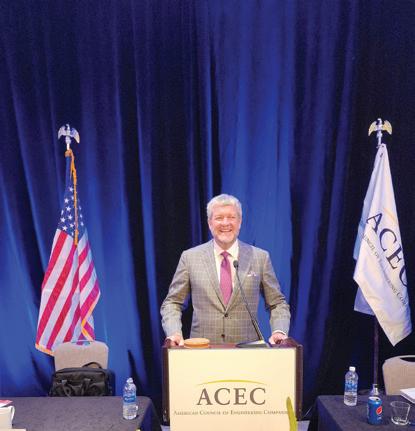



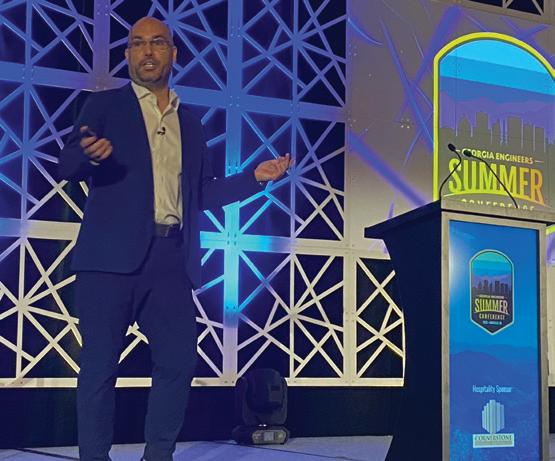

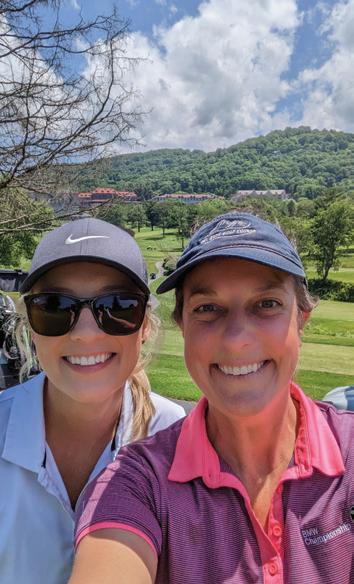


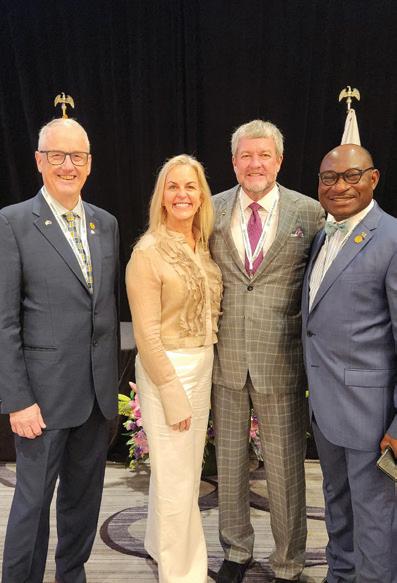
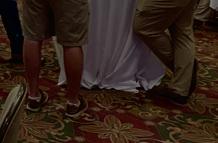


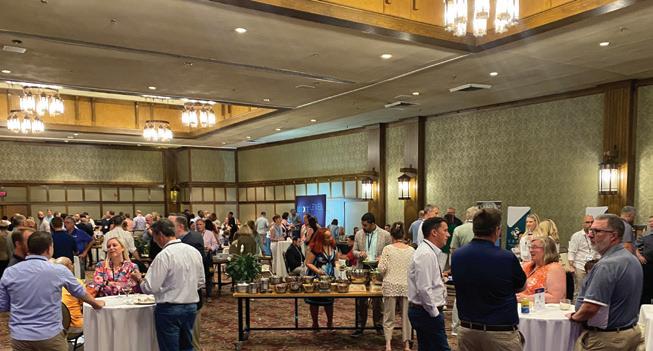


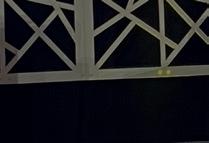
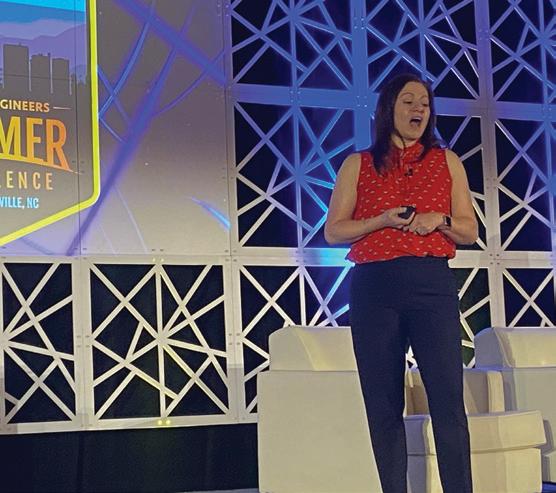

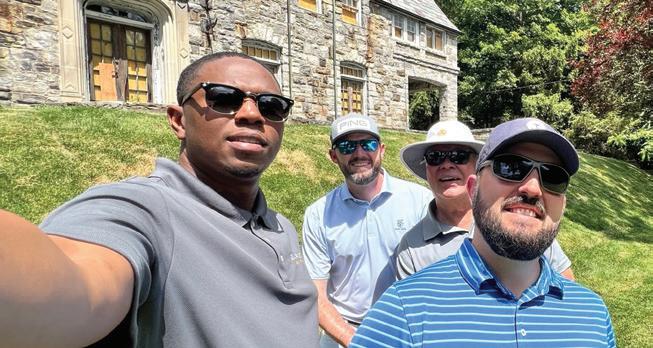 From left to right: Rakeem Jackson with Barge, Eddie Wade with Croy, Michael Kusch with Foley Products, and Joe Chevrier with ACPA
Kerry Kocur, VHB, speaking at the 2023 Summer Conference
Participants at the 2023 Georgia Engineers Summer Conference mingle and engage with exhibitors
ACEC Chairman Jay Wolverton and wife Ann Wolverton with FIDIC President Anthony Barry of Australia and FIDIC CEO Nelson Ogunshakin
Sasha Ugi with Croy and Holly Painter, ACEC Georgia Treasurer with KCI
Frank Lazaro, CERM, speaking at the 2023 Summer Conference
ACEC Chairman Jay Wolverton of CHA speaking after being sworn in as 2023-2024 ACEC National Chairman at the National Spring Conference
From left to right: Rakeem Jackson with Barge, Eddie Wade with Croy, Michael Kusch with Foley Products, and Joe Chevrier with ACPA
Kerry Kocur, VHB, speaking at the 2023 Summer Conference
Participants at the 2023 Georgia Engineers Summer Conference mingle and engage with exhibitors
ACEC Chairman Jay Wolverton and wife Ann Wolverton with FIDIC President Anthony Barry of Australia and FIDIC CEO Nelson Ogunshakin
Sasha Ugi with Croy and Holly Painter, ACEC Georgia Treasurer with KCI
Frank Lazaro, CERM, speaking at the 2023 Summer Conference
ACEC Chairman Jay Wolverton of CHA speaking after being sworn in as 2023-2024 ACEC National Chairman at the National Spring Conference
the pulse
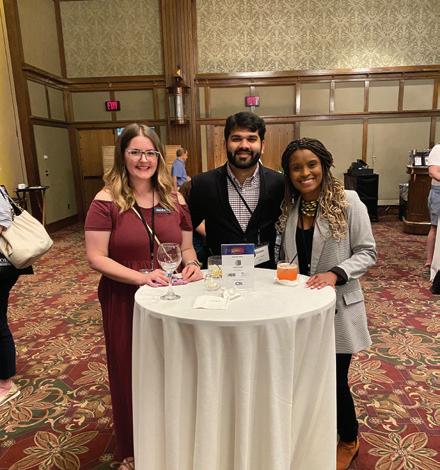

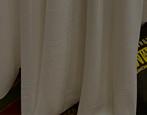

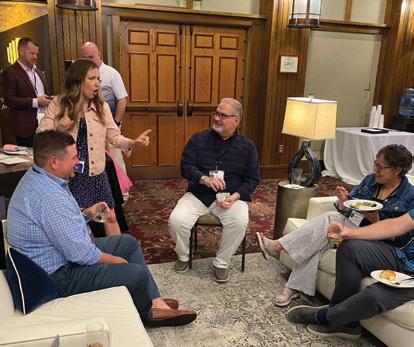


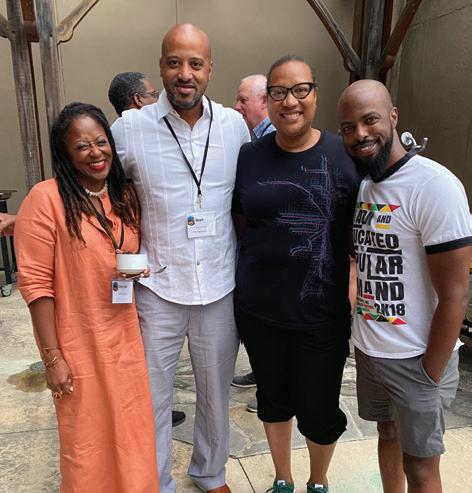

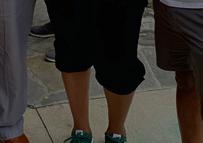

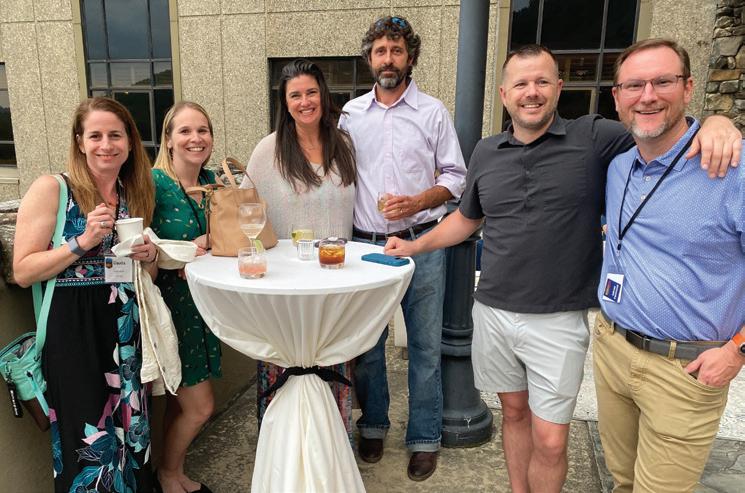


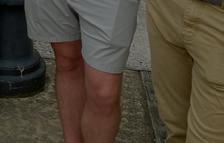

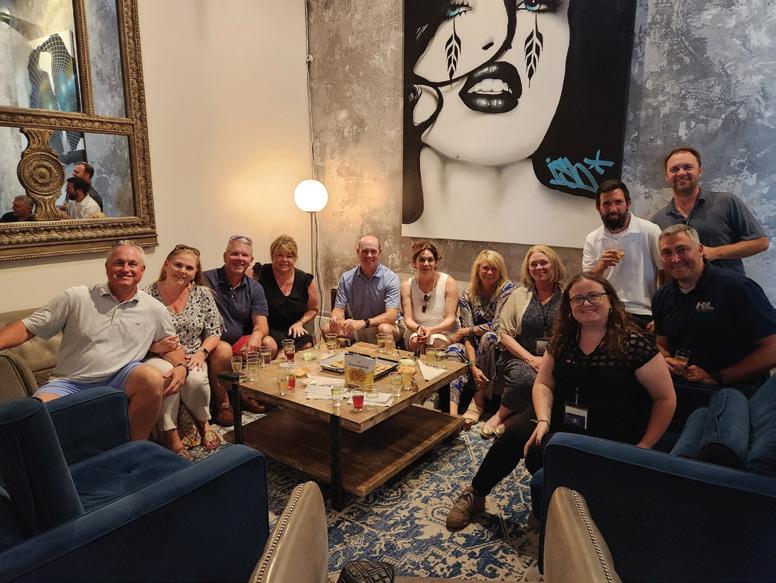



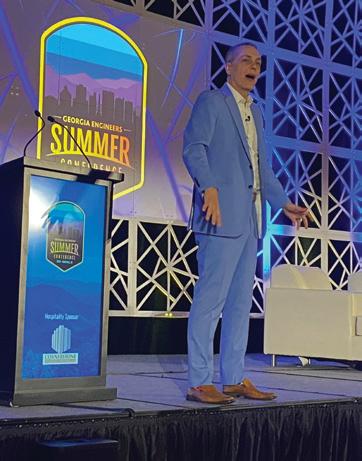
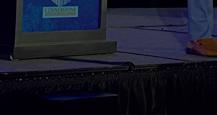
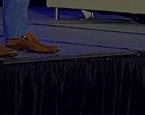
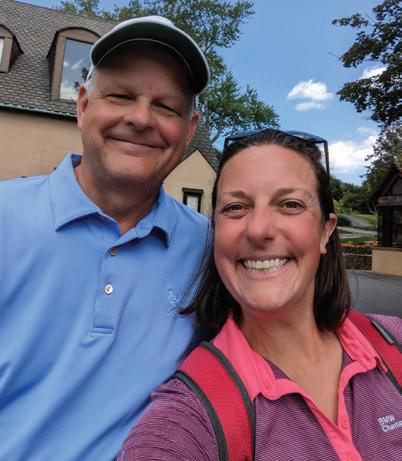
 ACEC Georgia Junior Board member Hayley Carmack, Shivam Chandra with 2MNEXT, and Akyiaa Morrison with 2MNext
Participants at the 2023 Georgia Engineers Summer Conference engage in meaningful conversations at the Cornerstone Financial Hospitality Corner. (Rob Jacquette, Brittany Meek, Erik Grandowsky, and Keith & Susan Costley)
Denyel Garland, Sean Garland with Pont Engineering, Mae Whiteside Williams with CKL Engineers, and her husband Malcolm Williams
Participants of the 2023 Summer Conference enjoy the evening dessert reception
From left to right: Jeff Simmons with Platinum Geomatics, Chris Simmons, Tom Hurby with Luster National, Rebecca Hurby, Roger Guilian with the ACEC Business Insurance Trust, Lydia Zabrycki with the ACEC Retirement Trust, Julie Bertilis with Oldcastle Infrastructure, Cindy Jenkins with Jacobs, Rachel King with CKL Engineers, Warren Dimsdale with Heath & Lineback, Aaron McCullough with Hughes-Ray Company (behind Matt), Matt Calak with Heath & Lineback enjoy cider from Urban Orchard as part of the Summer Conference's optional fun activities.
Keynote Speaker Ben Sorensen speaking at the 2023 Summer Conference
Holly Painter and Bayne Smith with KCI
ACEC Georgia Junior Board member Hayley Carmack, Shivam Chandra with 2MNEXT, and Akyiaa Morrison with 2MNext
Participants at the 2023 Georgia Engineers Summer Conference engage in meaningful conversations at the Cornerstone Financial Hospitality Corner. (Rob Jacquette, Brittany Meek, Erik Grandowsky, and Keith & Susan Costley)
Denyel Garland, Sean Garland with Pont Engineering, Mae Whiteside Williams with CKL Engineers, and her husband Malcolm Williams
Participants of the 2023 Summer Conference enjoy the evening dessert reception
From left to right: Jeff Simmons with Platinum Geomatics, Chris Simmons, Tom Hurby with Luster National, Rebecca Hurby, Roger Guilian with the ACEC Business Insurance Trust, Lydia Zabrycki with the ACEC Retirement Trust, Julie Bertilis with Oldcastle Infrastructure, Cindy Jenkins with Jacobs, Rachel King with CKL Engineers, Warren Dimsdale with Heath & Lineback, Aaron McCullough with Hughes-Ray Company (behind Matt), Matt Calak with Heath & Lineback enjoy cider from Urban Orchard as part of the Summer Conference's optional fun activities.
Keynote Speaker Ben Sorensen speaking at the 2023 Summer Conference
Holly Painter and Bayne Smith with KCI
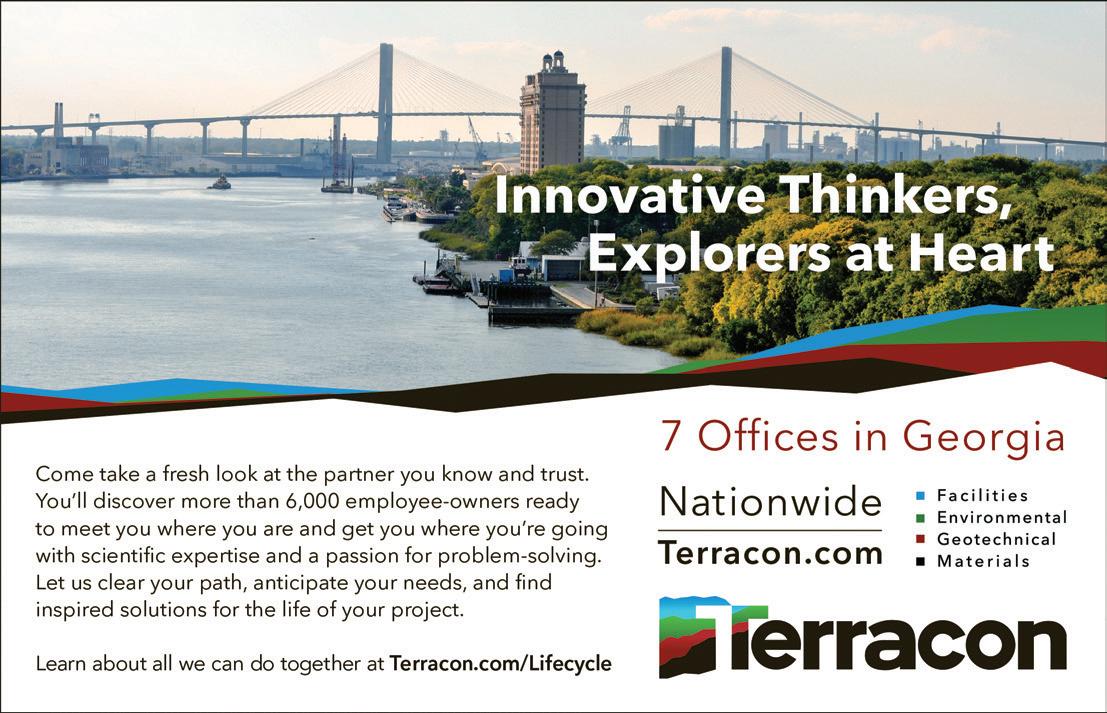
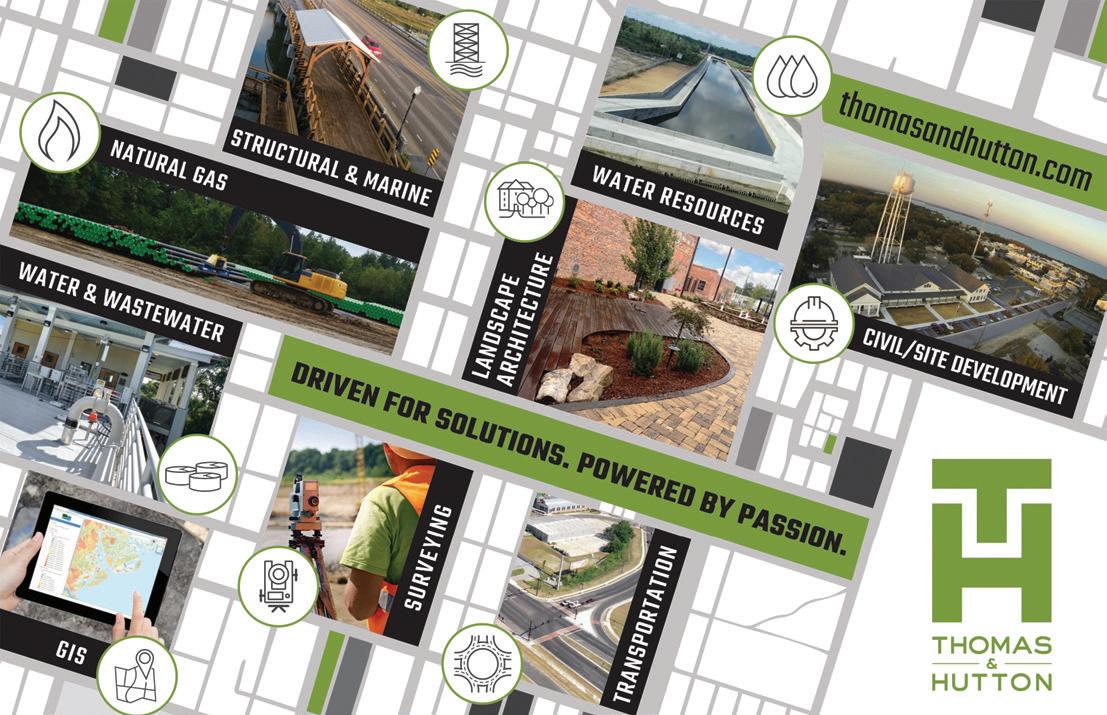
18 Engineering Georgia
GEORGIA NUMBERS by
SPECIES of native birds call Georgia home.
1825
INDIAN SPRINGS STATE PARK in Butts County is considered the oldest state park in the nation.
4,784
LOCATED IN THE NORTHEAST corner of the state, among the Blue Ridge Mountains, is Brasstown Bald, Georgia’s highest peak soaring to 4,784 feet.
1836
FOUNDED IN 1836, Wesleyan College in Macon was the first college in the world chartered to grant degrees to women.
18
THE GEOGRAPHIC CENTER of Georgia is in Twiggs County, 18 miles southeast of Macon.
the the pulse
350
July | August 19



20 Engineering Georgia
DAVID CARAVIELLO
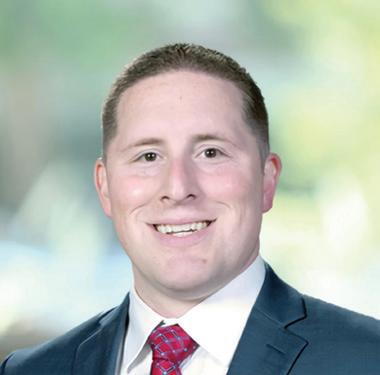
IIn popular culture, artificial intelligence is often portrayed as a danger to mankind—think the nefarious computer HAL 9000 in “2001: A Space Odyssey,” the machines that subdue humanity in “The Matrix,” or the shape-shifting killer robots of “Terminator 2.” But Michael Ramos offers another example pulled from the big screen when asked about the potential of AI today.
“With this technology coming online,” said Ramos, president of the Conyers-based architecture, engineering, and construction management firm Raymond, “the end goal is for every architect and engineer to be Tony Stark working with JARVIS.” N

Artificial intelligence offers civil engineering promise of greater efficiency, higher-quality work
July | August 21 engineering ga [ feature ]
Michael Ramos

22 Engineering Georgia engineering ga [ feature ]
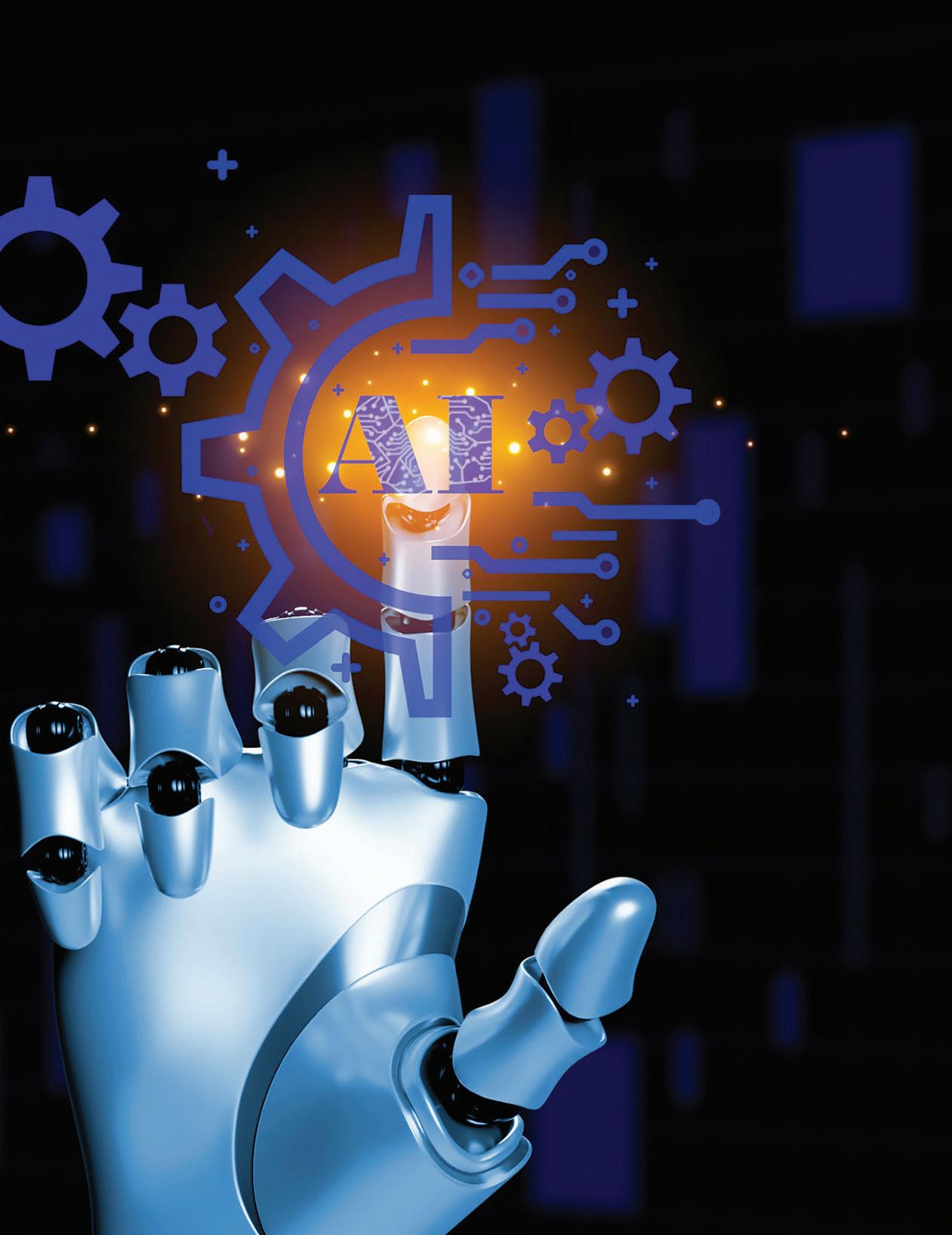
July | August 23

24 Engineering Georgia

July | August 25 engineering ga [ feature ]
Mike McMeekin, an engineer for 45 years, primarily at Lamp Rynearson in Omaha, Neb., has a different concern: AI that’s developed outside of the engineering industry being used in the practice of engineering.
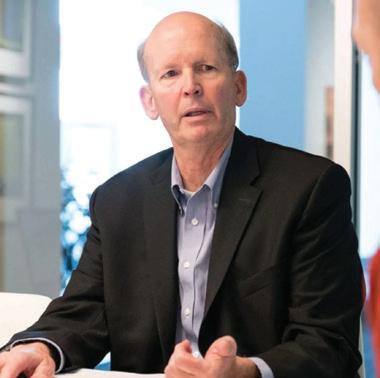

“An example of this is the AI that goes into autonomous vehicles. Those are mostly developed by unlicensed areas of computing and the engineering community. And then they're put into service on public roads system that is highly regulated and is subject to engineering licensure,” said McMeekin, president of Engineering Change Lab, an organization that focuses on the future of engineering.
“A principle that we keep emphasizing in our work is that sometimes technologies like AI are getting released to the public without a thorough examination of the potential unintended consequences and the potential negative impacts of those technologies,” McMeekin added. “Not only on the direct users but maybe on those that are indirectly impacted by the technology. If there is fear, I think it's justified. And I think we're not doing a good enough job of examining the impacts and the unintended consequences.”
For example, it’s not difficult to go online and find a detailed list of errors made by ChatGPT. A February post on the website Medium detailed several problems the system has had with reasoning, logic, math, coding, and even spelling, and the flatly incorrect answers it offered as a result. Now extend that to the prospect of AI developed outside the engineering industry being used to produce an engineering report. “Is the AI advanced enough to put those types of reports out without the quality control that they really need?” McMeekin asked. “The fear that they're putting out inaccurate, incorrect information is one thing that comes to mind.”
How do engineering firms avoid that? “My approach is basically that if we identify the key use cases at Raymond, we can test it in a much more safe and controlled environment as opposed to an outside, non-A/E/C company coming in and experimenting,” Ramos said. “This isn't going to be the case where you have startups guessing at use cases and trying to deploy. I think that's going to be a very, very hard sell. You'll have to have architects, engineers, and software developers working hand-in-hand to build out the use case, develop solutions, and repeatedly test before you can have any traction in deploying it in the market.” N
26 Engineering Georgia engineering ga [ feature ]
Mike McMeekin

July | August 27

28 Engineering Georgia engineering ga [ feature ]
Ramos—really ramping up the JARVIS analogy—foresees a day when engineers and construction personnel can wear a Google Glass-type of eyewear device that will combine AI with augmented reality, allowing them to spot potential safety hazards or monitor the condition of an ongoing project.
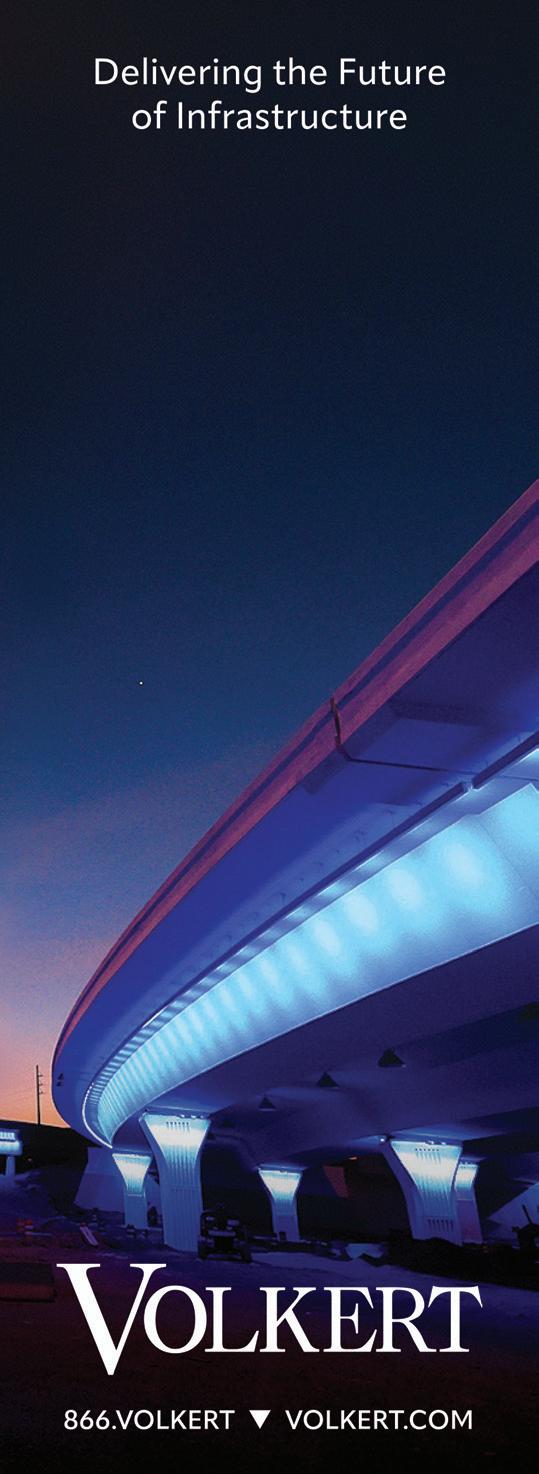
“I think long term, integrating AI with augmented reality is going to be really, really fun on the construction side,” Ramos added. “I think the integration of AI with a wearable is going to be pretty critical whether you're doing a facility condition assessment or looking for OSHA concerns. And if you are more junior personnel, having AI actually in your field of vision, helping you learn to do things or answer a question—I think all
One key to that integration, experts believe, is not isolating AI to a tech team largely separated from engineers in the field. “There is no project too unique for most AI systems to handle,” Dev Amratia, co-founder of the British machine learning company nPlan, told The Engineers Collective podcast in April. “You can’t silo this off to a digital team disassociated with the engineers making decisions on-site. You are bringing in these systems to

Indeed, those in civil engineering bullish on AI believe it can have a transformative impact on the industry, empowering individual engineers to make better decisions and focus more on higher-quality work. Artificial intelligence can analyze factors far too numerous for the human brain to comprehend, can make decisions without any inherent bias, can greatly increase the number of prototype designs, can mine vast amounts of historical data from past projects, and can relieve employees of many administrative tasks. And that’s just at the moment— those JARVIS-like AI/VR wearables that Ramos envisions are
Of course, there are others who are not quite ready to jump on board. “The A/E/C industry, in particular, doesn't want to change its process, and it comes down to legal liability,” Ramos said. “You have a highly trained individual that will stamp his or her work, and they assume all the liability for that work. And so, introducing a new technology of any kind can be problematic. But at the end of the day, we’ve got to break the perception that this is a technology that can be deployed and forgotten about.
How do you begin to convert holdouts? By getting them hands-on experience with trusted and tested AI systems that are proven to work and avoid McMeekin’s unintended consequences. Holding out too long, though, could come with a price. “Firms that choose not to engage with AI,” Amratia told
July | August 29
CREATING A SUSTAINABLE FUTURE THROUGH ENGINEERING

The Push for More Sustainable Engineering Projects
AAs Georgia’s first building to earn a Living Building Certification, The Kendeda Building for Innovative Sustainable Design is part building, part ecosystem. Originally envisioned in 2015, it began with a $30 million commitment from the Kendeda Fund. Today, the Kendeda Building produces more than 1.5 million gallons of water annually—15 times as much as it uses. It relies on solar panels and a small battery, pulling only from the power grid when needed and supplying power when there is excess. N
30 Engineering Georgia engineering ga [ feature ]
ZAWN VILLINES

July | August 31
GEORGIA’S FIRST BUILDING TO EARN A LIVING BUILDING CERTIFICATION, THE KENDEDA BUILDING FOR INNOVATIVE SUSTAINABLE DESIGN
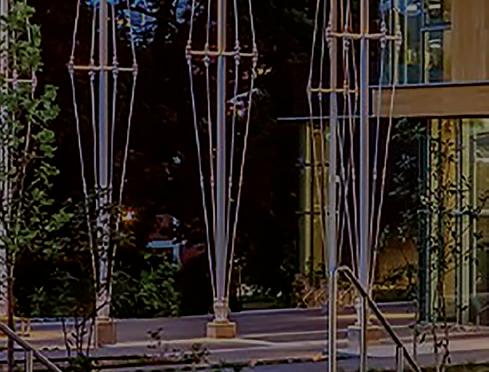


TODAY, THE KENDEDA BUILDING PRODUCES MORE THAN 1.5 MILLION GALLONS OF WATER ANNUALLY—15 TIMES AS MUCH AS IT USES.
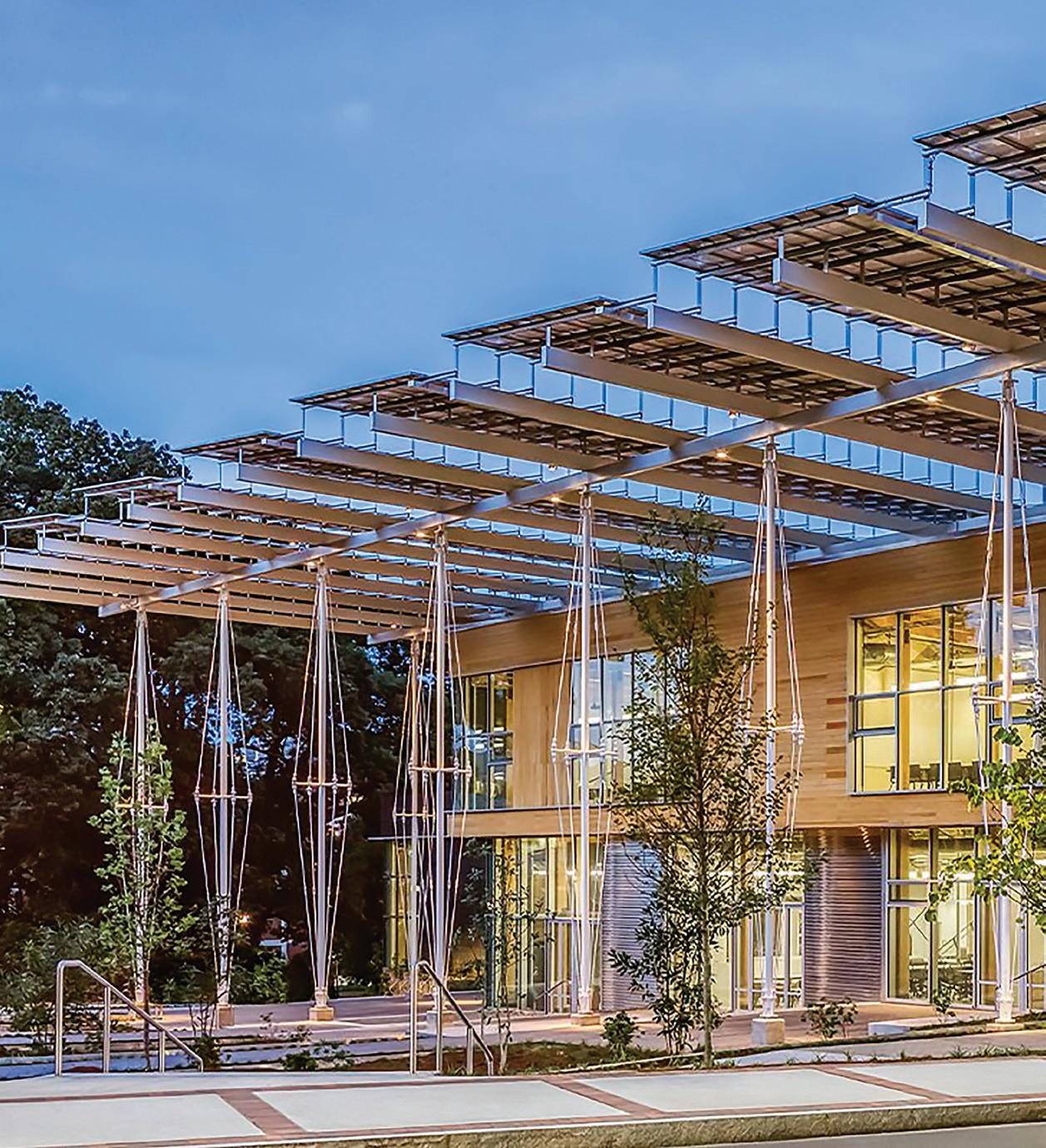
32 Engineering Georgia engineering ga [ feature ]
The project's construction achieved a zero carbon footprint by using salvaged building materials, recycling almost all construction waste, and finally by purchasing a carbon offset to fund solar power projects in India, which relies heavily on coal for electricity.
As one of just 28 Living Buildings worldwide, the Kendeda Building is a rarity. But it’s an emblem of what sustainable engineering can do. It’s also surprisingly economical. At a project cost of $532 per gross square foot of total project area, it was just 15% more expensive than a typical Georgia Tech campus building. It lacks many of the typical operating expenses of a campus building, though, thanks to its net-positive energy expenditure. So its value increases with time.
It’s also an attraction. Individuals and businesses can reserve events year-round, adding to the economic value of the building. Sustainable engineering is more than just a nod to the future and acknowledging the present political moment. It is the future, and it has the power to be incredibly profitable. N
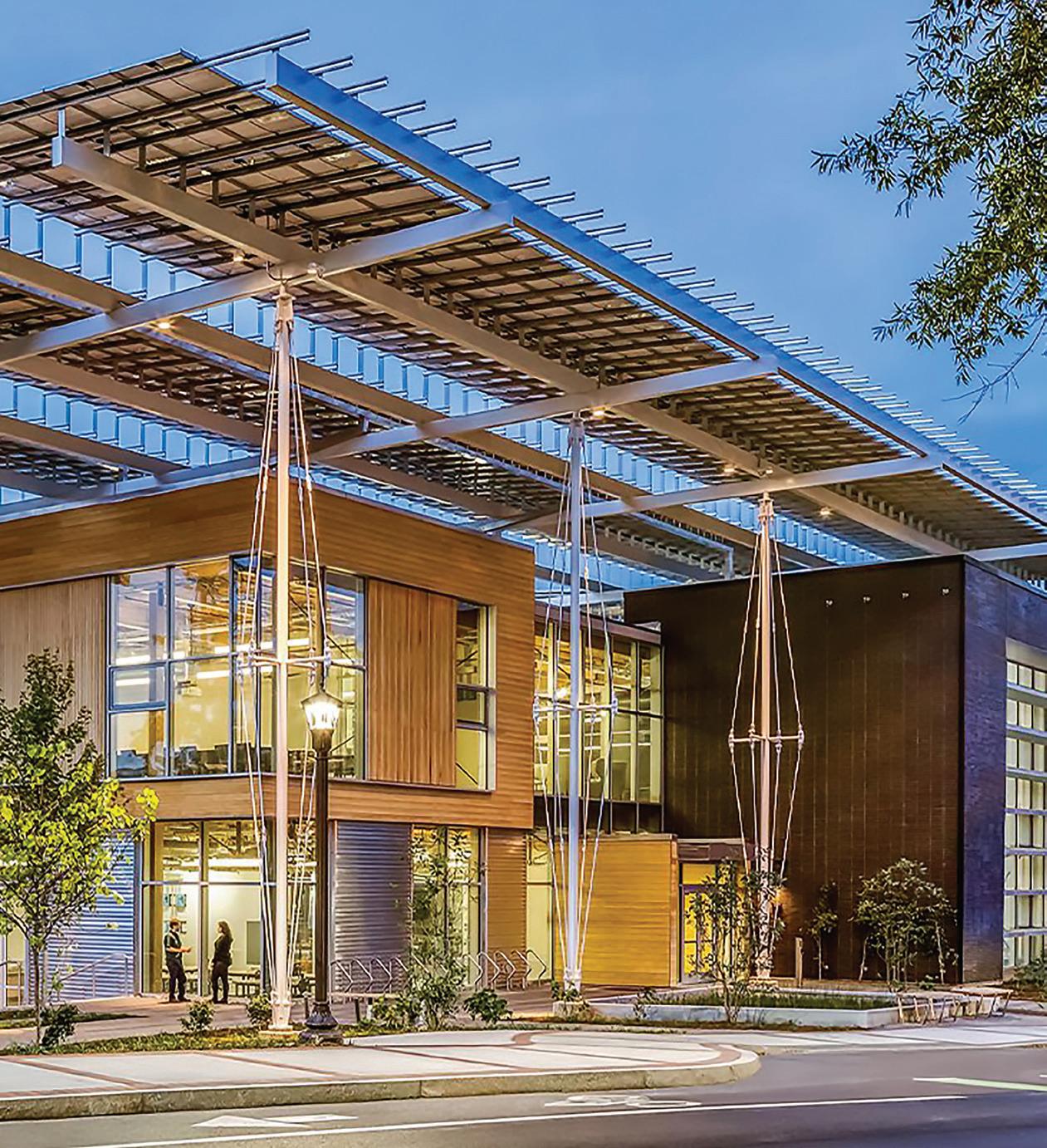
July | August 33
AT A PROJECT COST OF $532 PER GROSS SQUARE FOOT OF TOTAL PROJECT AREA, IT WAS JUST 15% MORE EXPENSIVE THAN A TYPICAL GEORGIA TECH CAMPUS BUILDING.
THE PUSH FOR MORE SUSTAINABLE ENGINEERING PROJECTS

“Every sector, including engineering and government, can contribute to sustainable development. All industries have the potential to adopt sustainable practices and reduce their environmental impact while contributing to social progress and economic prosperity,” said Jennifer Winn, Vice President of corporate sustainability at Georgia Power.
Without a livable world, there are no more engineering projects—and no more municipalities to fund them. This alone is reason to consider prioritizing sustainability to the greatest possible extent. Sustainability, though, is not an all-or-nothing proposition. Engineering firms can incorporate a range of environmentally friendly changes to reduce their carbon footprint, preserve and reuse resources, and reduce operating and maintenance costs. Even small changes can yield a significant long-term difference.
“Stakeholders are increasingly interested in the value of sustainable practices, and as the demand for sustainable infrastructure and technologies grows, firms that specialize in sustainable design can potentially enter into a rapidly expanding market. We are seeing tremendous economic growth, specifically in the state of Georgia, focused on renewables and clean energy, such as electric transportation, solar manufacturing, data centers, and growing number of diversified manufacturing companies. With a Georgia workforce qualified to support sustainable development, we can continue to attract investments, create jobs, and foster innovation in these industries, strengthening our state,” Winn added.
Sustainable engineering is experiencing a renaissance, especially in the worlds of civil and commercial engineering. Fifty-eight percent of engineering firms report reducing overall energy expenditures. And according to Deltek, three-quarters of organizations say they place more emphasis on environmental and social governance than they did in 2022. Fifty-seven percent of respondents said they will now only do
business with socially responsible companies. Companies that don’t embrace sustainability may soon see themselves with a smaller pool of clients.
“For our industry, I see sustainability in 2023 as at the stage that safety and quality control were several decades ago. While these concepts had their detractors and obstacles, they’re now critical considerations in the design and execution of projects. It won’t be long before sustainability is second nature in our work,” said Corey Babb, environmental consulting client manager at Woodard & Curran
According to data from Norwich University, 94% of engineers report already being engaged in sustainability practices. Twenty-eight percent report that more than 60% of their work follows environmentally sound practices.
A 2022 Gartner survey found that 87% of business leaders report that sustainability is a priority, and a key to preventing disruption.
Engineers are finding a sustainable home in residential construction, too. The drive for sustainability in home construction has soared, especially in the wake of the COVID pandemic. Porch reported in 2022 that:
• More than 2.4 million American homes have earned the Energy Star label, with 120,000 such homes built in 2022 alone.
• Energy Star-certified homes comprised 9% of new homes in 2022—up from 7% in 2021.
• Arizona is the leader in energy-efficient construction, with 42% of new homes earning an Energy Star certification.
In 2021, Georgia had 32,178 Energy Star-certified homes, and 1,195 Energy Star buildings. These numbers are rapidly growing, and so too is the demand for engineering firms that can achieve sustainability goals. Consumers understand that sustainable practices can save them money over the long-term. In a tight housing market with rising interest rates, these cost savings are especially attractive. N
58% OF ENGINEERING FIRMS REPORT REDUCING OVERALL ENERGY EXPENDITURES.
34 Engineering Georgia engineering ga [ feature ]
57% OF RESPONDENTS SAID THEY WILL NOW ONLY DO BUSINESS WITH SOCIALLY RESPONSIBLE COMPANIES.
MORE THAN 2.4 MILLION AMERICAN HOMES HAVE EARNED THE ENERGY STAR LABEL.

July | August 35
GEOTHERMAL HEATING, WATER RECYCLING, AND REMOTE MONITORING ALL HELP REDUCE PROJECTRELATED GREENHOUSE GAS EMISSIONS.


GEORGIA POWER HAS ALREADY REDUCED THEIR CARBON EMISSIONS BY MORE THAN 60% SINCE 2007.


36 Engineering Georgia engineering ga [ feature ]
SUSTAINABLE ENGINEERING IN GEORGIA
Sustainable engineering projects take many forms. Some integrate just a single sustainability practice while others, like the Kendeda Building, aim for energy neutrality, zero carbon emissions, and other lofty goals. Some of the most common areas of focus include:
• Using resources more effectively. This might involve using recycled or repurposed materials, reusing elements that are already present in a building, or developing environmentally friendly ways to manage waste.

• Reducing carbon emissions. Reducing carbon emissions through the use of renewable resources is one of the most important steps firms can take to ensure a healthier future. Sometimes this means supplementing nonrenewable energy sources with solar panels, wind, or other renewable energy sources. It might also mean sourcing materials locally or adopting other practices to reduce unnecessary emissions.
IN 2021, GEORGIA HAD 32,178 ENERGY STAR-CERTIFIED HOMES, AND 1,195 ENERGY STAR BUILDINGS.
• Addressing worker health issues. Exposure to toxic chemicals damages the environment, but can also cause immediate harms to workers’ health. Many firms are increasingly attentive to the well-being of their labor force, since an unhealthy labor force is not a sustainable one.
• Gaining deeper control over and understanding of labor and supply chain practices. Engineering firms frequently contract with other businesses. Increasingly, firms are demanding more insight into how these organizations mitigate environmental impact and improve the health of workers.
“We integrated the core elements of EPA’s Greener Cleanup program in the design, implementation, and operation of a groundwater remediation program in the Northeast. Geothermal heating, water recycling, and remote monitoring all help reduce project-related greenhouse gas emissions. Our project team also contributed to habitat protection and restoration initiatives, such as installation of duck boxes and pollinator hives, expansion of a turtle observation program, and an invasive species identification and removal program. The site was certified by the Wildlife Habitat Council in 2015,” Babb said. N
July | August 37
MORE THAN TWO-THIRDS OF MILLENNIALS REPORTED A WILLINGNESS TO PAY MORE FOR SUSTAINABLE PRODUCTS.
Winn highlighted Georgia Power’s efforts to reduce carbon emissions by transitioning its fleet to cleaner forms of energy and increasing reliance on renewable sources of energy.
“By transitioning away from coal-fired sources and implementing more renewables such as solar, continuing our work on Plant Vogtle Units 3 & 4 and exploring other sources, Georgia Power has already reduced our carbon emissions by more than 60% since 2007,” she said.
WHY GO SUSTAINABLE?
Sustainability does not have to mean compromising profitability, and companies that have switched to sustainable practices are already reaping the benefits. “The top two misconceptions related to sustainability that I hear most are that it is solely focused on environmental issues, and that it is always too costly,” said Winn.
The benefits of sustainable engineering extend well beyond a healthier planet. Operating and maintenance costs are also a consideration, and long and short-term economic benefits abound. Green practices usually save money in the long-term, which can be a significant selling point for governments, businesses, and consumers.
In a Nielsen survey, more than two-thirds of Millennials reported a willingness to pay more for sustainable products. With a strong consumer drive for sustainability, more businesses and governments are re-evaluating their processes. Green engineering is a great marketing opportunity and a chance for firms to stand out above the competition.

Other reasons to prioritize a shift toward sustainability include:
• To build public trust with potential clients. Consumers are increasingly pushing back against companies they perceive as harming the planet.
• To promote a stronger company culture. Your team may care more about their work when they feel like it’s part of a larger, future-centered mission—whether your team is in government, an engineering firm, a consulting firm, or a private business.
• To help clients comply with increasingly strict environmental regulations. Sustainable engineering can reduce regulatory issues, and may open access to markets with tighter environmental rules.
• As a branding tool. Sustainability is huge right now, and companies that prioritize sustainable practices may gain a significant competitive edge, especially in some regions.
• As an investment in the future. Sustainability ensures a company can remain competitive as environmental concerns become more central. N
38 Engineering Georgia engineering ga [ feature ]
WITH A STRONG CONSUMER DRIVE FOR SUSTAINABILITY, MORE BUSINESSES AND GOVERNMENTS ARE RE-EVALUATING THEIR PROCESSES.

July | August 39
WHILE WE DO THIS IMPORTANT WORK, WE MUST REMAIN FOCUSED ON HELPING OUR LOCAL COMMUNITIES REMAIN ECONOMICALLY VIBRANT AND HEALTHY.
FOR GOVERNMENTS AND ORGANIZATIONS THAT HAVE ESTABLISHED A SOLID PROGRAM, SUSTAINABILITY WILL WEATHER A RECESSION WITHOUT ISSUE.

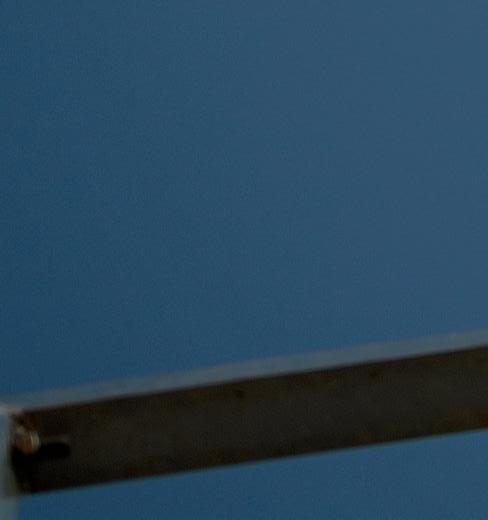


40 Engineering Georgia engineering ga [ feature ]
OVERCOMING SUSTAINABILITY CHALLENGES
Sustainability can be challenging, though, even when engineers feel a strong personal commitment to the environment and the future. For example, many communities have grown dependent on coal or other less environmentally friendly energy sources. As the push for sustainable options grows, some communities may experience job losses. Workers may not have adequate training to use new technologies. Entire communities may need to shift cultural norms to prepare the workforce for a more sustainable future.
“While we do this important work, we must remain focused on helping our local communities remain economically vibrant and healthy. This includes continuing to work with state and local authorities to mitigate potential economic impacts of coal plant retirements, striking a balance that is protective of our natural environment and communities,” said Winn.
Any future economic correction or recession could also result in sustainability budgets contracting. Sustainable practices are generally more expensive in the short-term, even when they offer significant long-term financial benefits.
But in organizations with existing programs, economic swings shouldn’t affect sustainability.
“For governments and organizations that have established a solid program, sustainability will weather a recession without issue. Especially in the private sector, where we see an increase in the requirement for disclosures, the focus on sustainability in operations and projects won’t wane,” Babb explained.
Potential economic fluctuations “may pose short-term challenges, but the long-term benefits and resilience associated with sustainability can still provide compelling reasons for continued investment and drive for sustainable projects,” Winn added.
Winn said that sustainability projects must also consider competing interests. Sudden changes in corporate practices can negatively affect consumers, especially when prices go up. N

ENTIRE COMMUNITIES MAY NEED TO SHIFT CULTURAL NORMS TO PREPARE THE WORKFORCE FOR A MORE SUSTAINABLE FUTURE.
July | August 41
“At Georgia Power, we believe that driving toward sustainability requires us to consider the dynamic environmental and social drivers of our diverse and wide-ranging stakeholders along with the economic needs of our state and balance our business to serve these needs equitably. We must put our customers first by weighing and balancing the provision of clean energy along with keeping prices low and reliability high. We do not believe that sustainability strategies can be focused on either environmental factors or economic factors alone, but that success is in finding the intersection where we can be protective of the environment, cost-effective, and have an optimal positive impact on the communities we serve. Sustainability aims to strike a balance between the environment, society, and the economy for long-term well-being,” she said.
The future of engineering depends on overcoming these challenges; sustainability gives engineers a chance to build a better future.
“Solutions with integrated sustainability help address more than just the immediate objective or goal. They introduce long-term restorative and regenerative benefits to organizations and communities that improve opportunities and outcomes for generations into the future,” said Babb.
Engineers and the people who hire them tend to be ambitious. Many entered the industry with plans to change the world. Sustainable engineering affords them the chance not just to change the world but potentially to save it, all while giving their business a competitive edge in the process. A

SUSTAINABLE ENGINEERING AFFORDS THEM THE CHANCE NOT JUST TO CHANGE THE WORLD BUT POTENTIALLY TO SAVE IT, ALL WHILE GIVING THEIR BUSINESS A COMPETITIVE EDGE IN THE PROCESS.
42 Engineering Georgia engineering ga [ feature ]
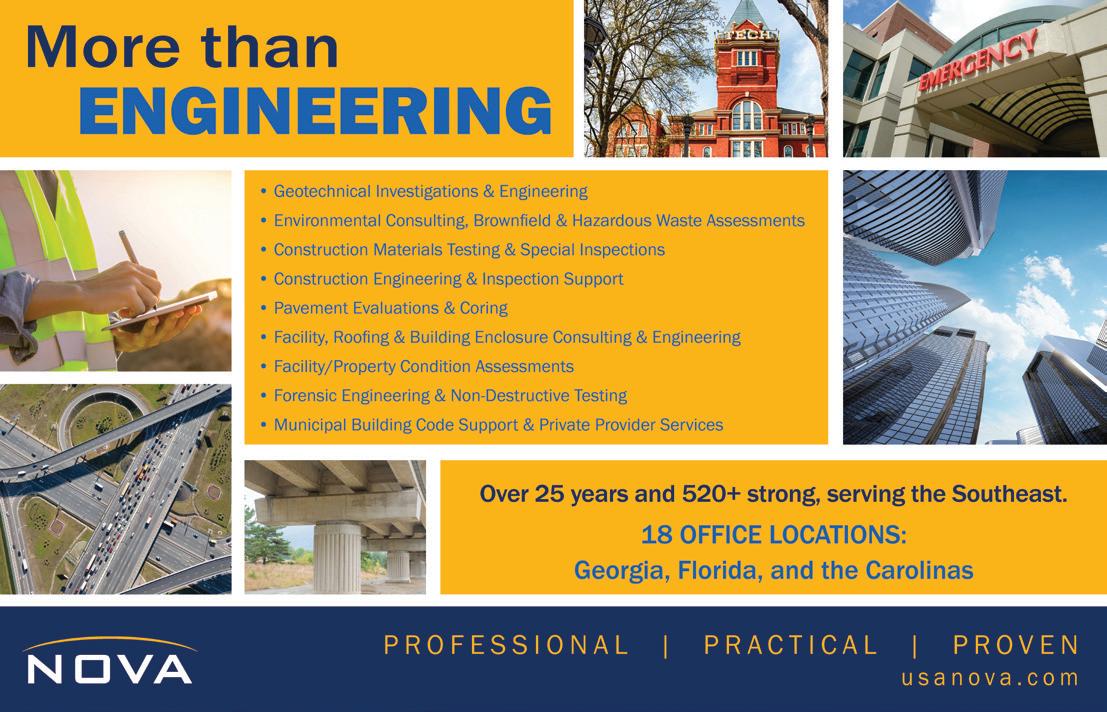

July | August 43
CYBER ATTACKS: IS YOUR COMPANY NEXT?




How Engineering Firms Must Protect Against Devastating Hacks and Data Breaches
EVE HENDERSHOT
This article is reprinted with the permission of the American Council of Engineering Companies (ACEC) and originally appeared in the Winter 2022 issue of Engineering Inc., ACEC’s quarterly business magazine.

MMany engineering frms aren’t fully aware of the major threat that cybercriminals pose to their business. But hackers’ ability and proclivity to cause expensive, destructive havoc is clear. In 2022 alone, a teen-led, extortion-focused cyber gang called Lapsus$ breached the defenses of Microsoft, Samsung, and Nvidia; health systems across the U.S. reported data breaches; and cybercriminals hijacked TV screens in 7-Eleven convenience stores across Taiwan to display messages protesting the visit of American congressional leader Nancy Pelosi.


Yet many engineering firms, along with other small and medium-sized businesses (SMBs), have been slow to shore up their cyber defenses. For example, nearly half (48 percent) of engineering firms haven’t purchased stand-alone insurance policies to protect against a cyberattack, according to the 2022 ACEC PLI Survey of Member Firms. That finding aligns with other recent research: Only half of SMBs have a cybersecurity plan in place, according to a survey from the service provider resource UpCity.
Insurance brokers who work with engineering firms say that to ignore cyber risk is to court disaster.

44 Engineering Georgia engineering ga [ feature ]
“Cyber coverage is not an optional coverage any longer. It’s only a matter of time before a company will face some sort of an attack,” says Mike Cosgrove, president of Professional Concepts Insurance Agency in Brighton, Michigan.
And there’s more bad news for any engineering executives who are hoping that their businesses will fly under the radar of hackers: “Architects and engineers have really come to find that they are favorite targets,” says Dan Buelow, managing director of WTW A&E, the architecture and engineering practice at insurance brokerage Willis Towers Watson. “We’re seeing significant exposure for design professionals, as well as significant business interruptions.”
“The need for firms of all sizes to have cyber coverage has grown tremendously over the past few years due to the increasing cybercrime activity,” says Johnna Wangensteen, account executive for Kraus-Anderson Insurance. “Most cybersecurity experts state that it is not if you will experience a cyber breach but when you will. If you use a computer, you need cyber insurance.”
Wangensteen adds, “We recommend for the vast majority of our clients to secure a stand-alone cyber policy. These policies typically
offer a wider range of coverage as well as higher-limit options. Our advice to all engineering firms would be to make sure you know and understand the coverage you are purchasing and where your risk lies. There are multiple carriers trying to sell cybersecurity, and no two policy forms are the same. Watch for carriers that have some experience in this area and have solid cyber services.”
Building and implementing a cyber defense strategy can be daunting, both because of the high stakes and the constantly evolving threat landscape. But as the volume and sophistication of cyberattacks increase, a robust and well-considered approach to cybersecurity is becoming a table-stakes component of corporate risk management. Accordingly, the most pressing question for engineering firms isn’t whether to pursue a cyber strategy, but how.
HOW INSURANCE FITS WITHIN A CYBER STRATEGY
A well-rounded approach to cybersecurity has three primary elements. The first is prevention, which aims to keep attackers from gaining access to crucial systems or data. Firewalls, software patches, passwords, and data encryption all fall into this category N
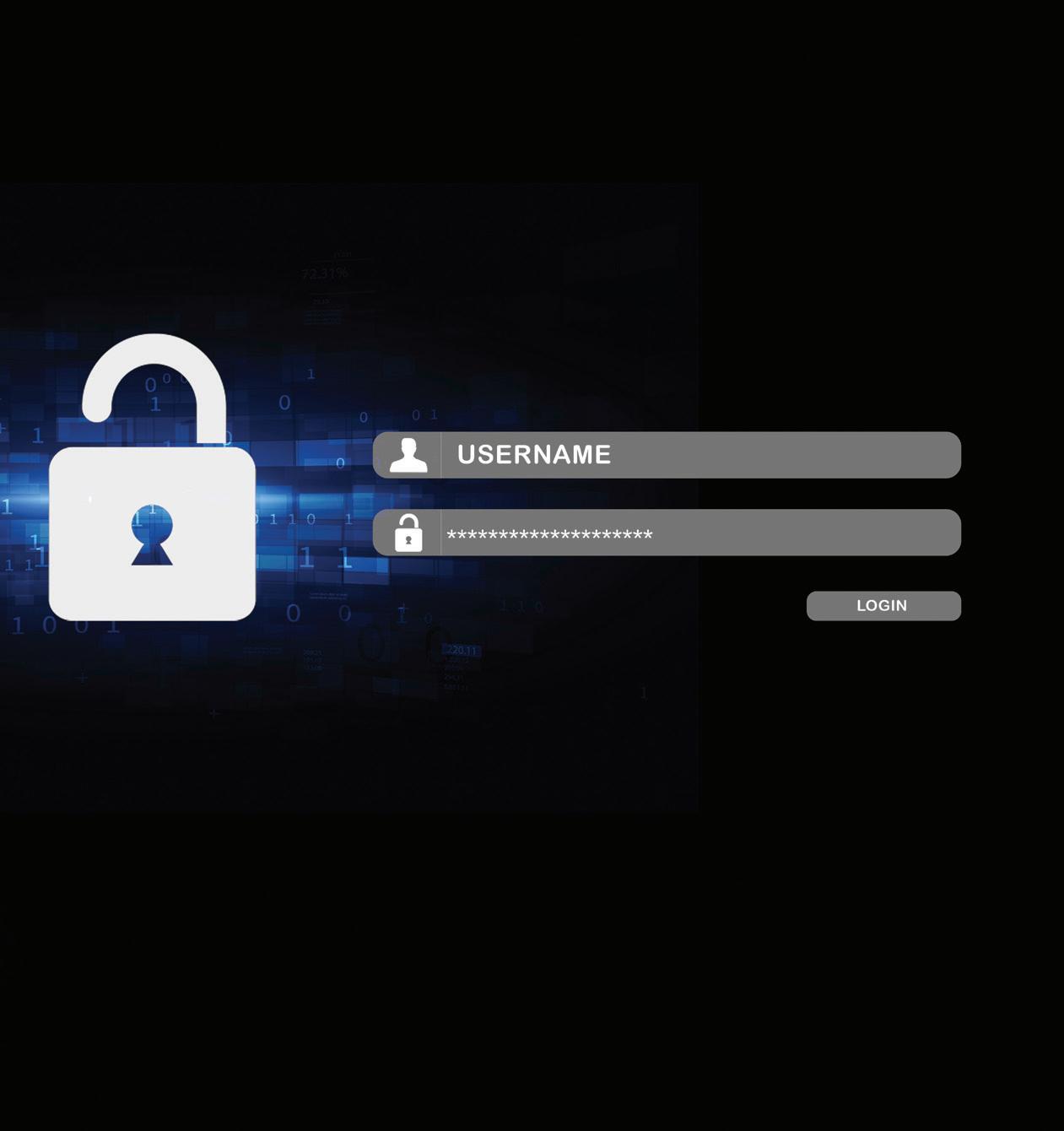
July | August 45 engineering ga [ feature ]
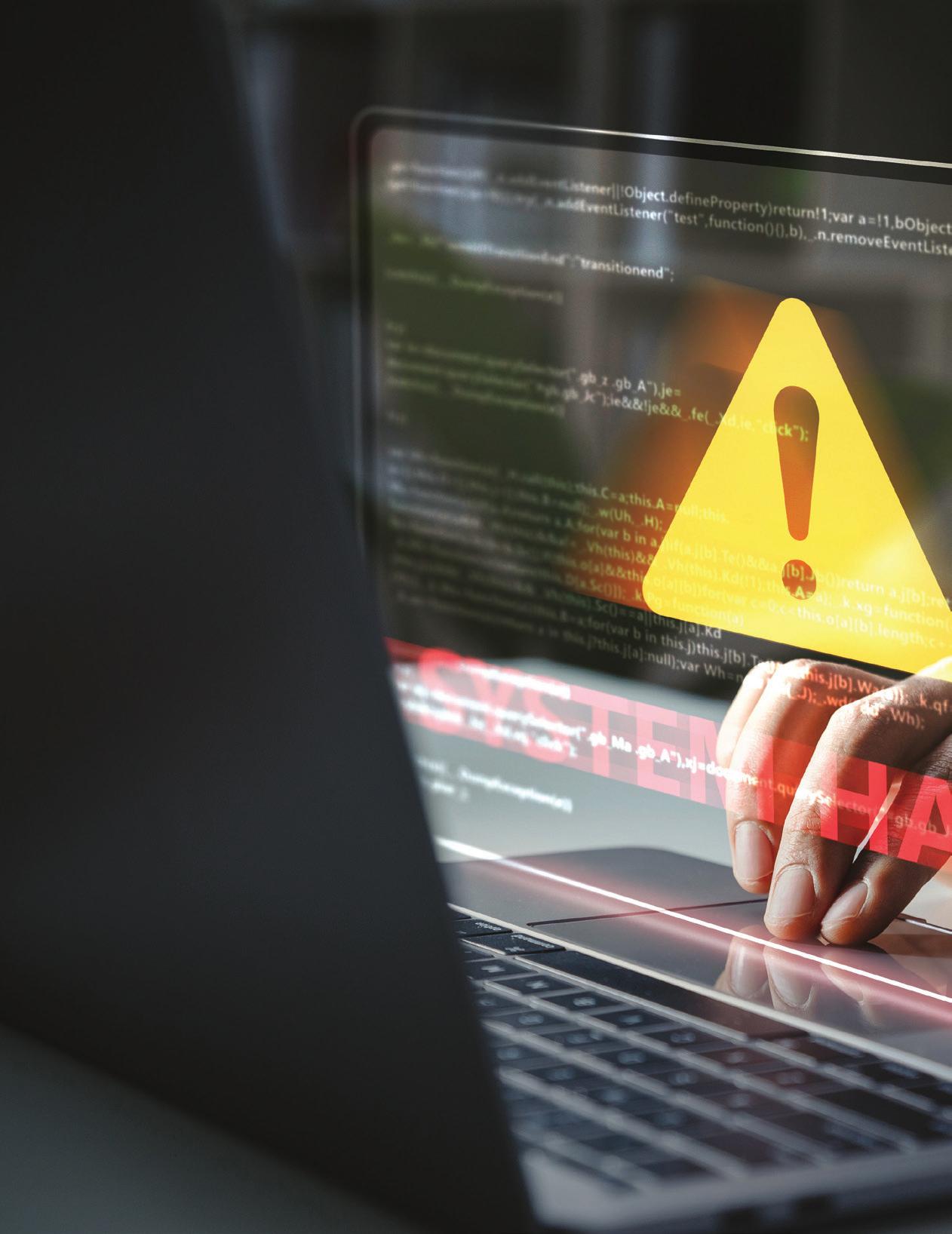
46 Engineering Georgia engineering ga [ feature ]
IN A PERFECT WORLD, A STRONG PERIMETER DEFENSE WOULD BE ENOUGH TO SECURE A COMPANY’S DATA.
In a perfect world, a strong perimeter defense would be enough to secure a company’s data. But attackers have proven themselves able to breach nearly any system, often without being noticed. That leads to the second part of a strong cybersecurity strategy: Companies must establish processes aimed at identifying and responding to attacks. What data did an intruder access after breaching the system? Do the attackers still have access? Once there’s conclusive evidence of an attack, specialists in digital forensics are often called upon to investigate the extent of the intrusion.
The third component to managing cyber risk is insurance. Over the last decade, cyber insurance has grown from an inexpensive, optional add-on to standard business insurance policies into stand-alone coverage that can come with hefty premiums—a consequence of a world where ransomware gangs routinely demand tens of millions of dollars from the companies they victimize.

Increased insurance premiums are not the only thing to change because of the wave of cyberattacks. Insurance companies may cap the amount of an exposure-related coverage for a particular type of attack. For example, Cosgrove cautions that a $2 million coverage limit cyber policy may only provide $100,000 of protection against phishing and other social-engineered attacks.
In addition, insurance carriers are increasingly offering coverage to firms prioritizing strong cyberattack-prevention practices. N
July | August 47
“A $2 MILLION COVERAGE LIMIT CYBER POLICY MAY ONLY PROVIDE $100,000 OF PROTECTION AGAINST PHISHING AND OTHER SOCIALENGINEERED ATTACKS.”
STAND-ALONE POLICIES ARE MORE APT TO PROVIDE HIGHER LIMITS OF COVERAGE ALONG WITH THE BROADER TERMS.

48 Engineering Georgia engineering ga [ feature ]
“There’s a lot more underwriting scrutiny around this coverage than we’ve seen in a long time, just because the risk is very volatile right now,” says Buelow, who sits on ACEC’s Risk Management Committee and leads a cyber-focused subgroup.
“We’re seeing an evolution in the controls that these insurance carriers are asking their clients to have in place, and in some cases, the carriers will not offer insurance or even renewal terms if companies don’t meet a certain standard.”
“Stand-alone cyber policies are the preferred method of mitigating this risk,” says Jeff Connelly, managing principal of Greyling.

“Most stand-alone policies offer a broader cover compared to endorsed PLI policies. Stand-alone policies are more apt to provide higher limits of coverage along with the broader terms. However, just going through the exercise of purchasing a cyber policy requires firms to have the proper
risk management practices in place such as MFA (multifactor authentication). Cyber insurance is becoming as essential as private liability insurance. It is just a matter of time before all contracts will require engineering firms to carry cyber insurance.”
The good news for engineering firms purchasing stand-alone cyber insurance is that most policies not only provide a financial safety net, but also access to a partner who can help round out a company’s approach to cybersecurity. While it’s generally the insured’s responsibility to have adequate processes to prevent cyberattacks, some insurers will step in quickly in the wake of a successful breach to assist with cyber forensics and response. For example, when one of Cosgrove’s clients reported a multimillion-dollar theft, the insurance carrier quickly alerted the U.S. Secret Service, which was able to claw back a substantial amount of the total stolen.
“When you’re buying a dedicated cyber policy, it’s not the carrier’s first rodeo. They’ll know what to do; they will be connected with experts who can help you, and they will guide you through the process of responding to an attack,” says Karen Erger, senior vice president and director of practice risk management at Lockton Companies in Kansas City, Missouri. Erger is also a member of the ACEC Risk Management Committee and a risk management columnist for Engineering Inc.
Carriers can also provide other valuable connections in the immediate aftermath of a cyberattack, such as making connections to breach coaches who can provide counsel in the event of cyber extortion. Carriers can facilitate specialized legal counsel—there are implications, for example, with client notification requirements stemming from the exposure of third-party client data, which is an especially relevant concern for engineers. N
July | August 49 engineering ga [ feature ]
“THERE’S A LOT MORE UNDERWRITING SCRUTINY AROUND THIS COVERAGE THAN WE’VE SEEN IN A LONG TIME, JUST BECAUSE THE RISK IS VERY VOLATILE RIGHT NOW.”
DON’T UNDERSTATE THE IMPORTANCE OF CONTINUOUSLY SENSITIZING EMPLOYEES TO THE NEED NOT TO CLICK ON FISHY LINKS AND NOT TO RESPOND TO EMAILS THAT SAY THE CEO IS TRAVELING AND NEEDS MONEY RIGHT AWAY.

50 Engineering Georgia engineering ga [ feature ]
“For engineers that are designing critical infrastructure or doing work with a government entity or anything that really touches the public, that’s a real threat,” says Erger. “It’s also potentially a breach of contract in cases where you’ve signed a contract with a confidentiality clause.”
Carriers sometimes also help with public relations expenses in the event that an attack threatens to harm a firm’s reputation.
GETTING YOUR HOUSE IN ORDER
Of course, the ideal outcome for any engineering firm is never to have to deal with the fallout of a major cyberattack. The first step toward warding off cyber thieves is mounting a strong defense.
Cyber insurance experts recommend several best practices to bolster your company’s defenses to prevent a cyberattack including the aforementioned MFA. Cosgrove says he’s noticed an increase in the number of carriers that are requiring MFA to issue a cyber policy.
“If a firm says no to an MFA, these carriers are just saying, ‘We wish you the best of luck, but we won’t insure you, even if we’ve been insuring you for the last eight years.’ Some carriers haven’t gone quite that far, but I think it’s just a matter of time,” he says.
Data storage is also a critical topic. Whether a firm’s data is encrypted, whether its servers are segmented, and how its backups are maintained all are components of an overall strategy aimed at resilience in the event of an attack.
Another flashpoint is establishing and communicating strong protocols around wire transfers. Cyber thieves have gotten very good at asking for money, often sending emails that impersonate
clients with astonishing precision. Buelow says some attackers have even updated engineering project documents to enhance the faux-authenticity of their communications—before supplying a new routing number and asking for payment.
Mounting a defense against such attacks can include process changes such as requiring verbal verification before replacing a routing number. Companies can also mandate that alterations to payment details occur only at a laptop or desktop computer, because it’s more difficult to spot a fraudulent email on a mobile device.

It’s just as critical to communicate frequently with employees about those processes.
“Don’t understate the importance of continuously sensitizing employees to the need not to click on fishy links and not to respond to emails that say the CEO is traveling and needs money right away,” says Erger.
That’s especially true given the sophisticated nature of advanced social engineering attacks. Sometimes the CEO really is traveling, a fact that the attackers may have gleaned by snooping on company email servers. Employees need to know that no request, no matter how urgent or apparently authoritative, is worth overriding the company’s security protocol.
Cybercriminals are growing more audacious, more sophisticated, more ruthless, and more effective. Rather than crossing their fingers and hoping to avoid an attack, engineering firms should develop a proactive approach to cybersecurity—one that incorporates best practices for attack prevention, as well as partnerships with insurers that can offer resilience in the event that an attacker does break through. N
July | August 51 engineering ga [ feature ]
“FOR ENGINEERS THAT ARE DESIGNING CRITICAL INFRASTRUCTURE OR DOING WORK WITH A GOVERNMENT ENTITY OR ANYTHING THAT REALLY TOUCHES THE PUBLIC, THAT’S A REAL THREAT.”
CYBERCRIMINALS EMPLOY VARIOUS TACTICS TO CARRY OUT THEIR ATTACKS, USUALLY AIMED AT BREAKING INTO COMPANY SERVERS, GAINING ACCESS TO SENSITIVE INFORMATION, OR REDIRECTING PAYMENTS TO FRAUDULENT ACCOUNTS.

52 Engineering Georgia engineering ga [ feature ]
CYBERCRIME GLOSSARY
Cybercriminals employ various tactics to carry out their attacks, usually aimed at breaking into company servers, gaining access to sensitive information, or redirecting payments to fraudulent accounts. Here are a few of the most common cyberattack methods:
Distributed Denial of Service (DDoS) attack: An attempt to cause a website to crash by overloading servers with traffic
Malware: An umbrella term for software designed to facilitate a cyberattack
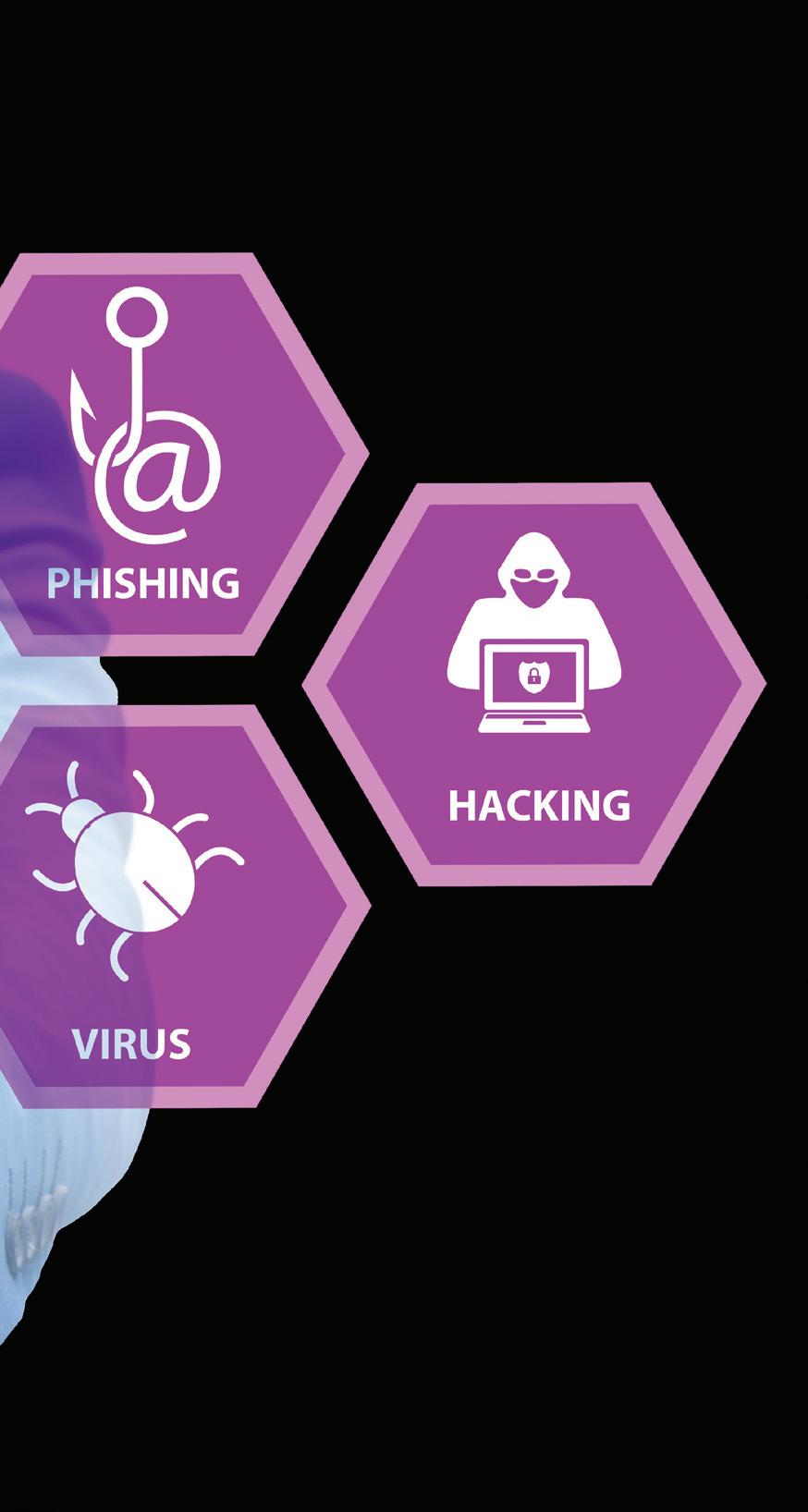
Phishing: Fraudulent messages intended to gain access to sensitive data, often financial information; many phishing attacks appear to come from trusted senders
Ransomware: A type of malware that blocks access to a device or network until the owner pays a ransom
Spyware: A type of malware that enables the attacker to monitor activity and gather information A
July | August 53
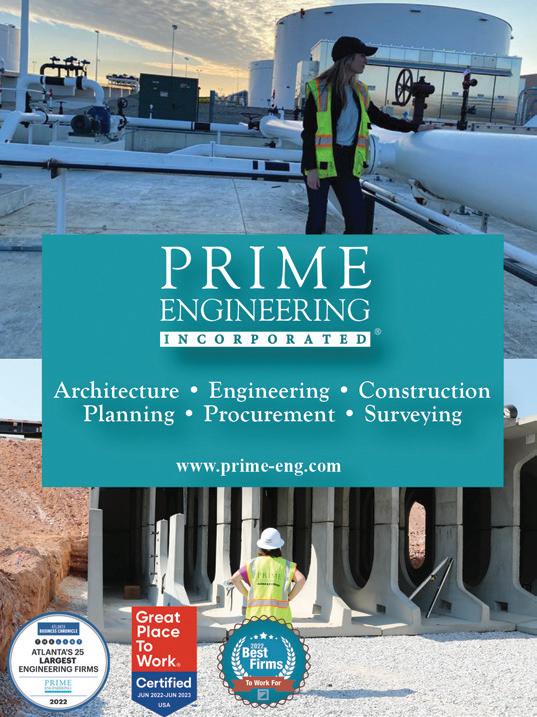

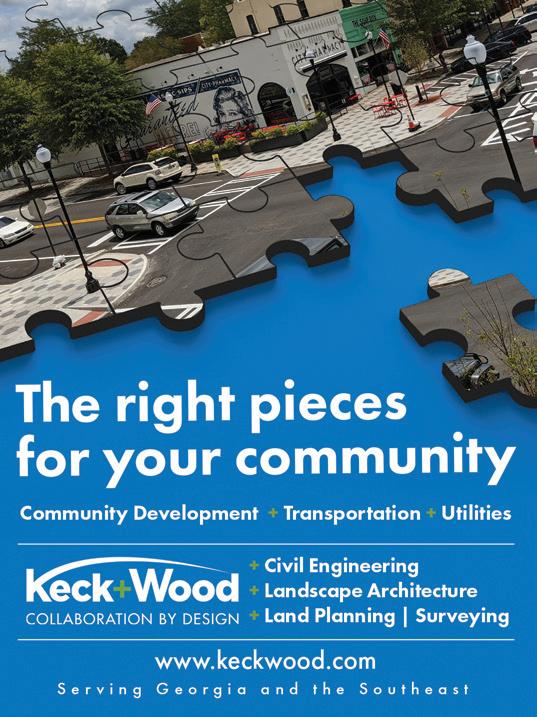

54 Engineering Georgia
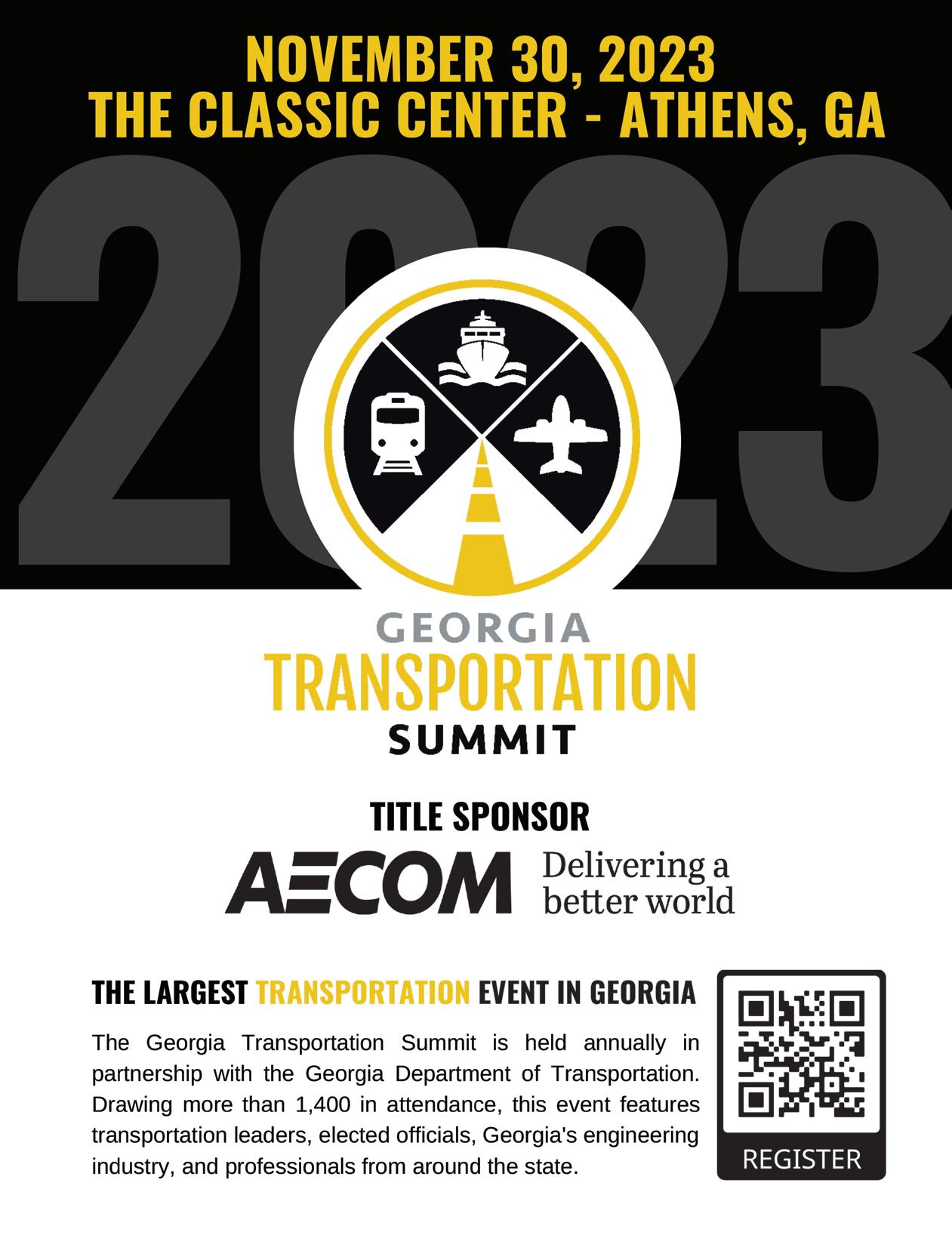
P.E., F. ASCE
Pierson Enterprises ASCE Georgia President www.ascega.org
ASCE GEORGIA HIGHLIGHT: 2023 ANNUAL BANQUET AND AWARDS AND 110TH ANNIVERSARY CELEBRATION
In June, the Georgia Section of ASCE held its Annual Awards Banquet. We celebrated the past year’s accomplishments, recognized exceptional State of Georgia civil engineers and projects, and launched a new year of providing value to civil engineers working for a better Georgia. ASCE President-Elect Marsia Geldert-Murphy, PE, F. ASCE, joined the Section for a day-and-a-half whirlwind visit that included many members gatherings, key meetings with influential regional leaders, and the Annual Awards Banquet held at the Omni Hotel and Resort, Battery Park. She also provided the Georgia Section with an inspiring vision followed with inaugurating the 2023-2024 Board of Directors.
2023 ASCE GEORGIA PROJECT AWARDS
The Georgia Section awarded four projects of excellence that highlight the top civil engineering projects in the state. These impressive civil engineering achievements are announced in no particular order or category. Look at our website ascega.org for more details about this great projects.
Vibe at Echo Street West:
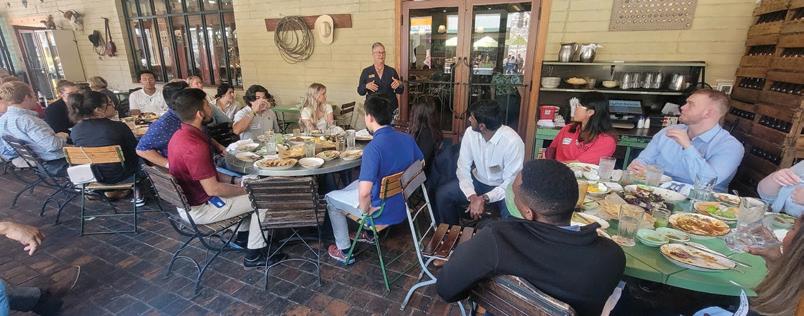
Lincoln Property Company
Cheshire Bridge Replacement over South Fork Peachtree Creek: City of Atlanta
Fulton County Animal Services Facility:
Fulton County
Children's Healthcare of Atlanta (CHOA)
North Druid Hills Hospital and Campus: CHOA
2023 ASCE GEORGIA INDIVIDUAL AWARDS
Civil Engineer of the Year: Jidong J. Yang, PhD, PE, M. ASCE Young Engineer of the Year: David Glassman, PE, M. ASCE Volunteer of the Year: Sam Dennard, EIT, M. ASCE
Student of the Year | Georgia Intitute of Technology: Lisa Wu, S.M. ASCE
Student of the Year | Kennesaw State University: Carter Henderson, S.M. ASCE Student of the Year | Mercer University: Benjamin Jones, S.M. ASCE Student of the Year | University of Georgia: Arthur Taran, S.M. ASCE President's Awards: Stefka Vacheva, EIT, M. ASCE | Raj Anand, PE, M. ASCE | Bobby Saur, PE, M. ASCE
2022-2023 ASCE NATIONAL RECOGNITION AND AWARDS
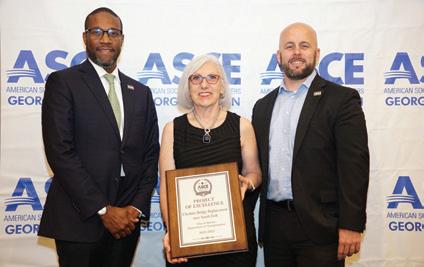
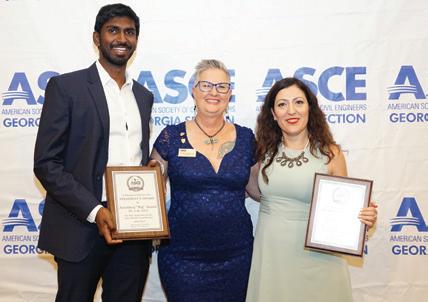
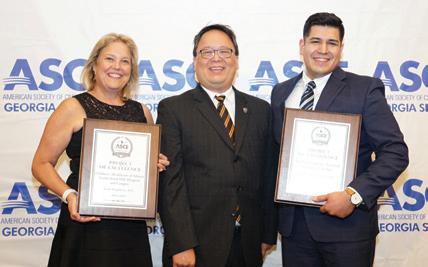
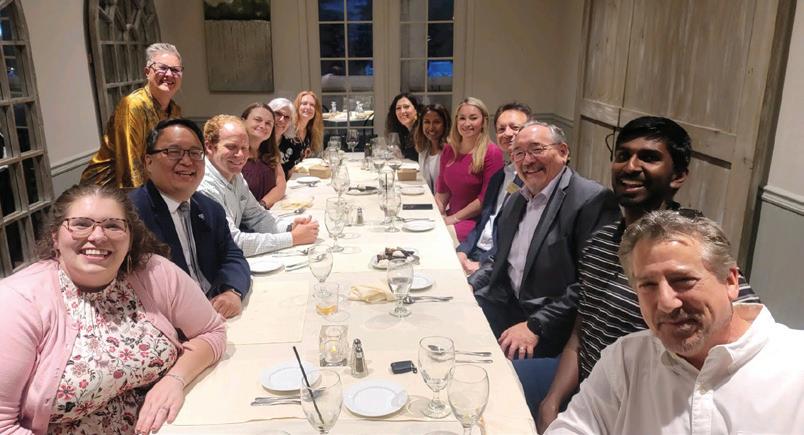
EWRI Outstanding Local Chapter: Caroline Smith, EIT, M. ASCE (President) Outstanding Section of the Year First Awarding, MOSAIC JEDI Award (Leadership for Justice, Equality, Diversity, and Inclusivity):
Stephen Simpson, PE, Fellow ASCE Steve Poole, PE, Fellow ASCE
association [ news ]
JOHN PIERSON,
56 Engineering Georgia
SARAH BLACKBURN, PE
Gresham, Smith and Partners
ASHE Georgia President www.georgia.ashe.pro
INTRODUCING ASHE GEORGIA CHAPTER OFFICERS FOR NEXT YEAR
President: Sarah Blackburn (GS&P)
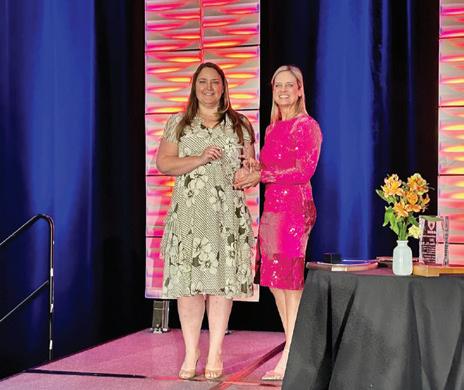
1st Vice President: Lindsey Dunnahoo (AECOM)
2nd Vice President: Bradley Cox (Gwinnett County)
Secretary: Tori Brinkley (WSP)
Co-Secretary: Jennifer Lott (Aulick Engineering)
Treasurer: James Nguyen (Peachtree Corners)
Co-Treasurer: Pervez Iqbal (CHA)
Immediate Past President/ Nominating Committee: Shawn Fleet (H&L Engineers),
Director Year 1: Chris Rideout (Croy Engineering)
Director Year 2: Ravi Vachhani (Moffat & Nichol)
Director Year 3: Steve Mosher (Barge Design)
RECAP 2023 ASHE NATIONAL CONFERENCE

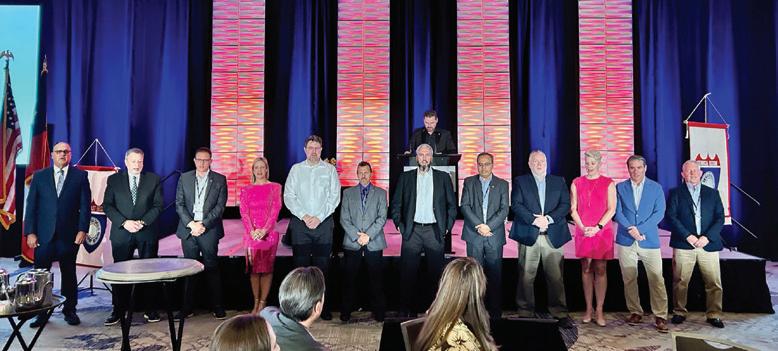
ASHE Georgia Section was honored to host the 2023 ASHE National Conference in Atlanta, Georgia, on June 7th- 11th. It was a few days filled with networking, fun group projects, various events around town, and interesting technical sessions! Thank you to the Conference Team and Volunteers for making this event successful.
ANNUAL MEMBERSHIP RENEWAL
Membership with ASHE provides you with access to excellent technical programs and networking opportunities throughout the year. Log in to your ASHE account through our website to update your membership.
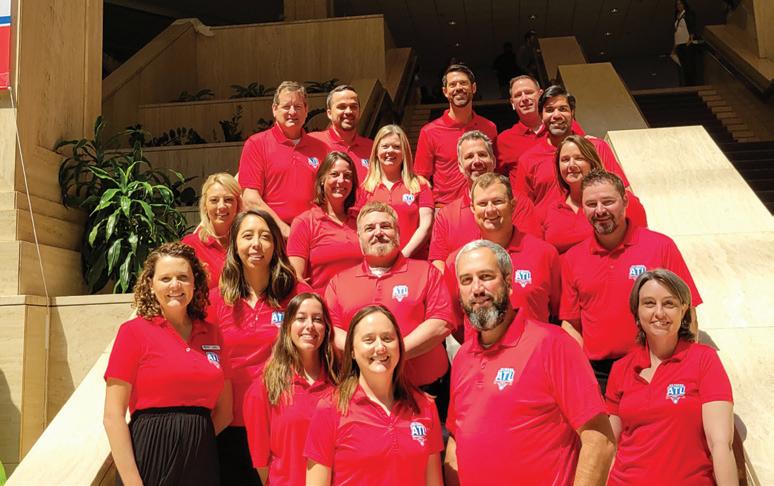
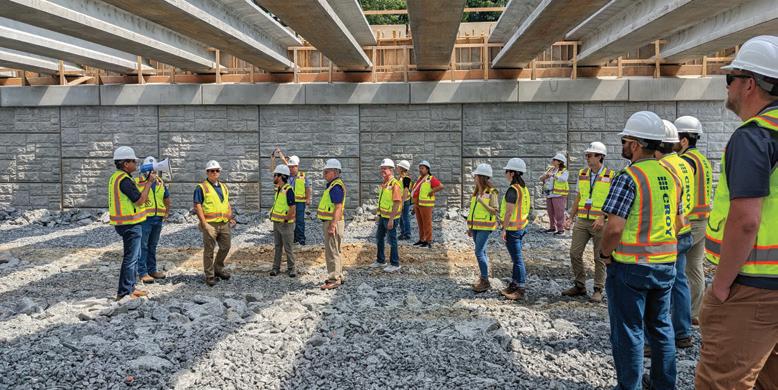
association [ news ]
July | August 57
ROBINSON NICOL,
Atlas GAITE President president@gaite.org
The summer is a busy time for GAITE. Our Activities Committee held a bowling social at The Painted Duck on May 25th. Additionally, we have continued our monthly meeting schedule with a meeting in June. Our June meeting was at Monday Night Garage and we heard from Masoud Hamedi who gave a presentation and training on the Iteris ClearGuide Application. As a reminder, GAITE encourages student attendance at our monthly meetings. Students are free at all monthly meetings if registered online prior to the meeting.
In July, we took a break from our regular monthly meetings to attend Summer Seminar. This annual conference takes place at St. Simons Island and features a strong technical program along with social events, guest activities, scholarship auction, and banquet. The theme for this year’s conference is Oh, the Places We’ll Go and we would like to thank the planning committee as well as all of our sponsors who make this event our most highly anticipated event of the year.
We also recently received notification that one of our members, Aimee Turner with Croy Engineering, was recognized by ITE as a Future Young Leader to Follow. The ITE Young Leaders to Follow program was designed to recognize and highlight talented ITE members under the age of 35 who have already made a mark on ITE and the transportation industry and are leaders to follow in the years to come.
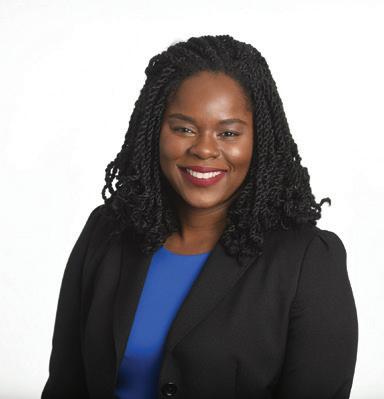
We have multiple upcoming events including our ITE Joint International Meeting held in Portland, OR. We will also have a joint ITE/ITS Braves game in August, followed by our Annual Golf Tournament that will be held in early October at Smoke Rise Country Club.
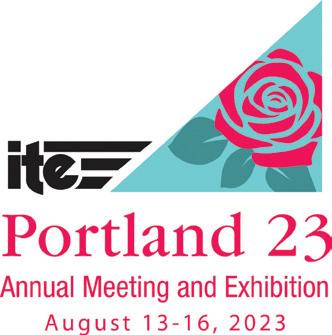
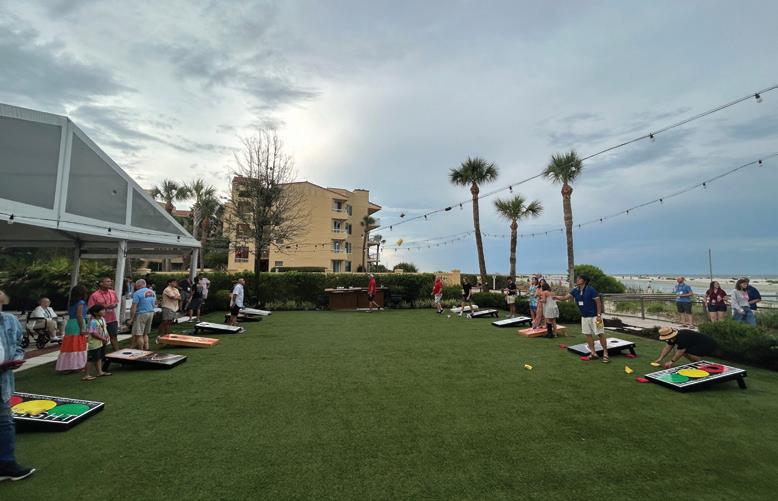


If you would like to be a part of Georgia ITE, please see our website at: gaite.org/join.php on information on how to join. When you join ITE International, you are automatically added as a member of your local section. Members receive discounts on our monthly meetings and events and have the opportunity to serve on our various committees.
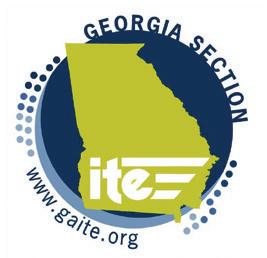 PE, PTOE
PE, PTOE
SOCIAL AT THE PAINTED DUCK
www.gaite.org BOWLING
JUNE MEETING AT MONDAY NIGHT GARAGE
GAITE SUMMER SEMINAR CORNHOLE TOURNAMENT
ITE PORTLAND 23
FUTURE YOUNG LEADER TO FOLLOW: AIMEE TURNER, CROY ENGINEERING
58 Engineering Georgia
CAPT JOHN PRIEN, CEC, USN (RET)
The Clorox Company
 GEF President
GEF President

john.prien@clorox.com
www.gefinc.org
The Georgia Engineering Foundation (GEF) is immensely grateful for the support of our professional society members, engineering firm benefactors, and individual endowment partners, as well as our board members, both past and present, who have helped to build and sustain GEF during our past 50 years (Happy Birthday!!!).



Our history dates back to February 1972 when a newly elected board of directors from diverse professional societies, engineering firms, and cultural backgrounds would translate a vision into a living reality – a dynamic entity that would bring together the energies and resources of the entire engineering community of the State of Georgia to accomplish philanthropic and educational goals which none of the existing engineering societies or associations could accomplish alone.
GEF’s objectives were and continue to be
1) a cementing element in attaining philanthropic and educational objectives of the total engineering community in Georgia; 2) be structured efficiently to encourage the pooling of resources for efficiently delivering financial help to the next generation of engineers; 3) provide opportunities for communicating to the public the role of engineering and the engineer in society; 4) attract engineers of business and technical prominence to serve freely toward the accomplishment of objectives for which they have a sense of community responsibility and interest; and 5) be a tax-exempt depository of funds from all groups or individuals desirous of encouraging philanthropic and educational pursuits.
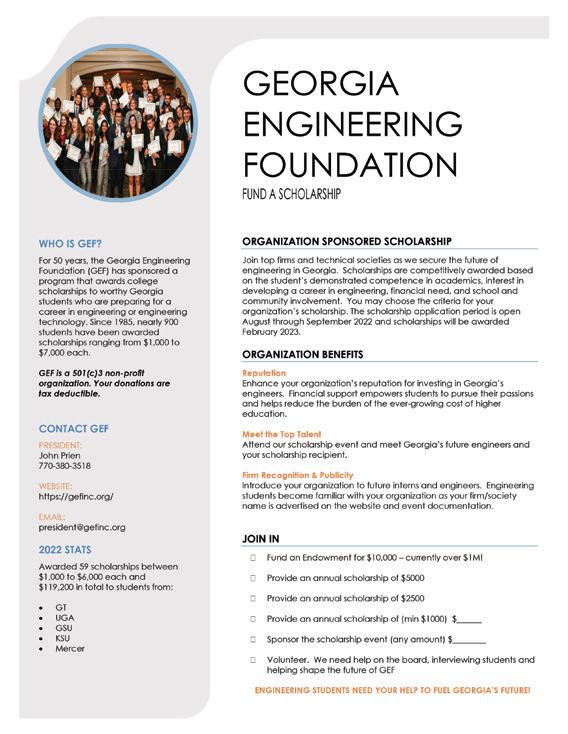
GEF’s professionally conducted scholarship program allows our members and benefactors to define specific scholarship criteria and efficiently deliver financial help to the next generation. GEF’s volunteer efforts bring a larger pool of deserving candidates forward for consideration while at the same time allowing our members to be free from the administrative time and costs associated with independently running their own program.
Now more than ever, it is critical to invest in the future leadership of our Nation and the greater engineering community. You can know that GEF will assure that each scholarship is awarded on benefactor goals, student merit, and with a strong consideration of each scholar’s financial need. As the need for financial assistance continues to grow, your generosity is needed now more than ever. If you are interested in setting up a scholarship or endowment or volunteering to serve, please reach out to GEF at President@gefinc.org.
association [ news ]
July | August 59
PROTECTING THE PE LICENSE: A GROWING CONCERN
MITCH PAULK, PE, PLS
GSPE President
mitch.paulk@land.engineering www.gspe.org
WELCOME AMANDA HENDLEY AS GSPE'S NEW EXECUTIVE DIRECTOR
We are thrilled to welcome Amanda Hendley as GSPE’s new Executive Director. She is a Georgia Tech grad who comes to GSPE with 18 years of experience with organizations such as the Technology Association of Georgia (TAG) and Computer Measurement Group (CMG). Her passion for promoting the engineering profession and advancing the interests of our members makes her a valuable addition to our team, and we look forward to working together to further strengthen GSPE's impact on the engineering community in Georgia.
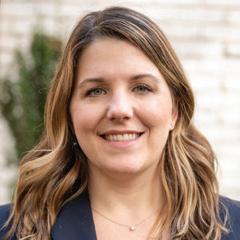
DEFENDING THE PROFESSIONAL ENGINEER (PE) LICENSE: SAFEGUARDING OUR PROFESSION
As President of the Georgia Society of Professional Engineers (GSPE), it is essential to reinforce the significance of the Professional Engineer (PE) license and raise awareness about the challenges it faces. The PE license represents a vital cornerstone in our society, ensuring public safety, promoting high standards, and upholding ethical practices.
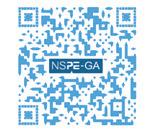
THE IMPORTANCE OF THE PROFESSIONAL ENGINEER (PE) LICENSE
The PE license is a symbol of an engineer's ethical commitment and engineering competence. It not only provides a level of confidence to the public but also ensures that new initiatives are being overseen by qualified professionals who adhere to stringent ethical standards.
The PE license is facing challenges in several states across the nation. As populations increase, the demand for engineering services will only grow. If the supply does not meet the demand, it is inevitable that legislation will be proposed to relax licensure requirements. As stated on the National Society of Professional Engineers (NSPE) website, there are ongoing efforts to weaken or eliminate licensure requirements, which could have far-reaching consequences for the engineering community and the public we serve.
GSPE'S COMMITMENT: ADVOCATING FOR THE PE LICENSE
At GSPE, one of our primary objectives is to be a staunch advocate for the PE license. We actively monitor and engage with legislative initiatives that could impact the licensure process. By staying abreast of these developments, we can be proactive in guiding lawmakers to maintain the intent of the professional license while ensuring public safety remains paramount.
A SIGNIFICANT MILESTONE: PROTECTING THE PE LICENSE IN GEORGIA
A landmark achievement for the engineering community in Georgia was the removal of the Georgia Professional Engineers and Land Surveyors Board (PELS Board) from under the Secretary of State's office. This critical step enhances the independence of the board, ensuring that its primary focus remains safeguarding the PE license and maintaining the highest standards of engineering practice.
EMBRACING CHANGE: THE DECOUPLING DISCUSSION
Recently, there have been favorable discussions among the engineering and surveying ranks in Georgia regarding the possibility of adopting decoupling. Decoupling would separate the requirements of professional experience from the PE Exam. While we recognize the potential benefits of decoupling, we must ensure that any such changes maintain the integrity of the PE license and do not compromise public safety.
CONCLUSION
As Professional Engineers, we understand the pivotal role that the PE license plays in shaping our profession and ensuring the well-being of the public. GSPE is committed to actively advocating for the protection of the PE license and working collaboratively with lawmakers and other stakeholders to shape legislation that upholds the highest standards of engineering practice. By staying united and proactive, we can secure the future of our profession and continue to serve the public with the excellence they deserve.
We at GSPE are also working very hard to enhance the tangible benefits of being a member. I hope this article enlightens you on one of those key benefits. If you are a licensed Professional Engineer in Georgia and not a member of GSPE then I encourage you to please consider joining. Feel free to contact me at any time if you would like more information.
association [ news ] TO LEARN MORE VISIT GSPE.ORG | TO JOIN VISIT NSPE.ORG/MEMBERSHIP/JOIN-NOW CONNECT WITH US ON SOCIAL MEDIA! Facebook.com/gspeorg Linkedin.com/company/Georgia-society-of-professional-engineers www.youtube.com/GSPEng
60 Engineering Georgia
THOMAS GLUECKERT, PE, PTOE
Kimley-Horn
ITS Georgia President itsgachapter@gmail.com www.itsga.org
2023 ANNUAL MEETING AND EXPOSITION
THE WESTIN JEKYLL ISLAND, JEKYLL ISLAND

SEPTEMBER 24 – 26, 2023
The theme for the 2023 Annual Conference is "Evolution of ITS". At this event we'll have great technical sessions covering the past, present, and future of ITS both inside and outside of Georgia. We’ll start Sunday off with a golf tournament and cap each evening off with great networking events including a Sunday night dinner/casino night and the Monday night reception with a live band.
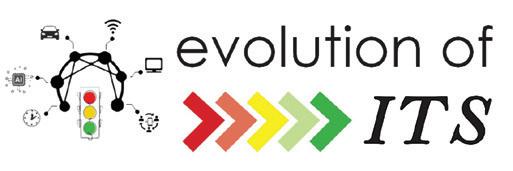
Scan the QR Code on the right for all the conference information. Specific QR codes below for easy access!




KEYNOTE SPEAKER:
MICHAEL GRAHAM from the National Transportation Safety Board
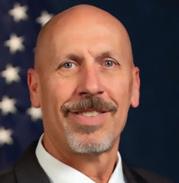
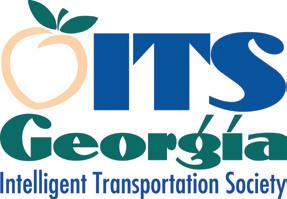
MONDAY NIGHT RECEPTION FEATURING LIVE MUSIC from Atlanta's own KURT THOMAS
RESULTS, AND

association [ news ]
July | August 61
REGISTER TODAY FOR NETWORKING OPPORTUNITIES, TECHNICAL SESSIONS, ITSGA ELECTION
MORE! WE WILL SEE YOU IN A FEW WEEKS!
MICHAEL RAMOS RAYMOND
SAME
SERVING TOGETHER, DELIVERING THE POST VISION AND FULFILLING THE MISSION OF THE SOCIETY
One of the missions of the SAME Atlanta Post is to encourage, stimulate, and sponsor the development of future engineering leaders. Every year, the Post selects upcoming and current college students for our Post’s scholarship program. I’m happy to report that in June, we gave out $20,000 in scholarships to an amazing cohort of students. Specifically, our 2023 scholarship awardees:
Mr. William Kaye, a current student at Georgia Tech, who has maintained a GPA of 4.0 and is studying Computer Science of Ocean Engineering. In his spare time, he enjoys playing video games, running, and golfing. After graduation, William plans to commission into the U.S. Navy’s Cyber Warfare Engineering program.
UPCOMING EVENTS
Mr. Tyler Kleinsasser, a current student at the South Dakota School of Mines, who has maintained a GPA of 4.0 and is studying civil engineering and engineering management. In his spare time, he enjoys hiking, reading, and sports. After graduation, Tyler plans to pursue an engineering career and eventually start his own company.
Mr. Mason Ladd, a current student at Georgia Tech, who has maintained a 4.0 GPA and is studying civil engineering. He is currently serving in the Army ROTC Program and SAME student Chapter Treasurer. Mason wanted us to know his reason for majoring in Civil Engineering is to help jump start his career in the Army as an Engineer Officer. He said this decision was made in partnership with committing his time and talent to the Army ROTC program. His hope is to be commissioned to the US Army and serve our country for most of his career. In his spare time, he enjoys hiking, camping, fishing, and exercising.
Mr. Clay Elliott Anderson, a recent graduate from Woodward Academy, who will be studying engineering at Virginia Tech. In his spare time, he enjoys competitive swimming, learning about history and technology, and playing video games. He also is an Eagle Scout and Assistant Den Leader for Cub Scout Pack 631. After graduation, Elliott plans to become a military engineer working for the Department of Defense or a government contractor.
Ms. Alyssa Khalil will be attending Georgia Tech in the fall of 2023 to study computer science, and she graduated high school with a 4.0 GPA. In her spare time, she enjoys
playing tennis, hiking, and photography. After graduation, Alyssa plans to pursue a career in cybersecurity with the U.S. government.
Ms. Rachel Miller will be attending the United States Naval Academy and has maintained a GPA of 4.0 at Blessed Trinity Catholic High School and plans to study Computer Science. In her spare time, she enjoys running, cooking, and having fun with her friends. After graduation, Rachel plans to commission as a pilot in the Navy or Marine Corps.
Mr. Matthew Peck is a graduate of Franklin High School where he achieved a GPA of 4.45 and was class Salutatorian. In the Fall he will attend North Carolina State University to study statistics and computer science. In his spare time, he enjoys cooking, working out, and reading. After graduation, Mathew plans to be commissioned through the ROTC program as an officer in the U.S. Air Force.
Beyond scholarships, the Atlanta Post recently held our July Program on Coastline Resiliency, where we hosted Dr. Michele Covi and Dr. Mark Risse from the University of Georgia. Their presentation on efforts to protect Georgia’s national resources and coastline from climate change and natural disasters was fascinating. The July Program was a good lead-in for our upcoming August Small Business event, which will focus on the Sources Sought process in federal contracting.
Finally, should you have interest in getting involved with the Atlanta Post, please do not hesitate to contact me directly. We are always looking for our future leaders, both in Atlanta and within SAME’s National ranks.
NOVEMBER:
association [ news ]
Atlanta Post President
Small Business & IGE Program + First Annual Young Professionals 5K Race
MEGA Meeting, Shrimp Boil & GT Tailgate
Capture Planning & Strategy Session
mike.ramos@raymondllc.com www.sameatlantapost.org Atlanta Post AUGUST:
SEPTEMBER:
OCTOBER:
SAME Small Business Conference
Atlanta Post Holiday Party
invited to join us at one of our upcoming events! Visit our website for more information and register. LEARN MORE ABOUT SAME & CONNECT WITH US! sameatlantapost.org linkedin.com/company/same-atlanta-post
DECEMBER:
You’re
62 Engineering Georgia
CHRIS LYTLE
Uzun & Case Engineers, LLC
SEAOG President
www.seaog.org
NEWS
It's time to renew SEAOG memberships for 2023-2024. The term started July 1, 2023, and ends June 30, 2024.
UPCOMING EVENTS
SEAOG members! Please join us for our end of summer social networking event. It will be held on WEDNESDAY, AUGUST 23, AT WILD LEAP BREWING (5:00 PM – 7:00 PM).


EVENT RECAP
Our May meeting provided an opportunity for SEAOG members to get a hands-on demonstration of post-installed anchors at Simpson Strong-Tie’s Marietta facility. The demonstration included installation and testing of adhesive, expansion, and screw type anchors. Thanks to Simpson for offering their space and providing a great learning experience for our members.
We will also take a walking tour of the recently completed Centennial Yards South restoration project of the old Southern Railway and Norfolk Southern headquarters.
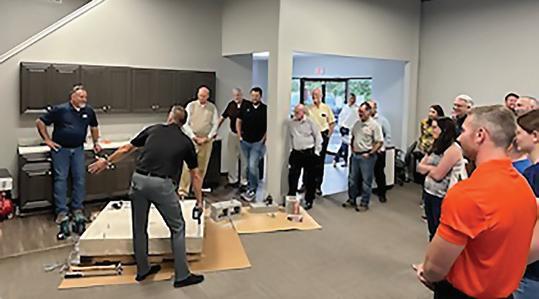
association [ news ]
July | August 63
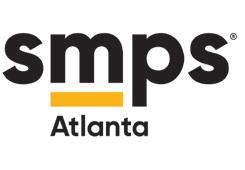
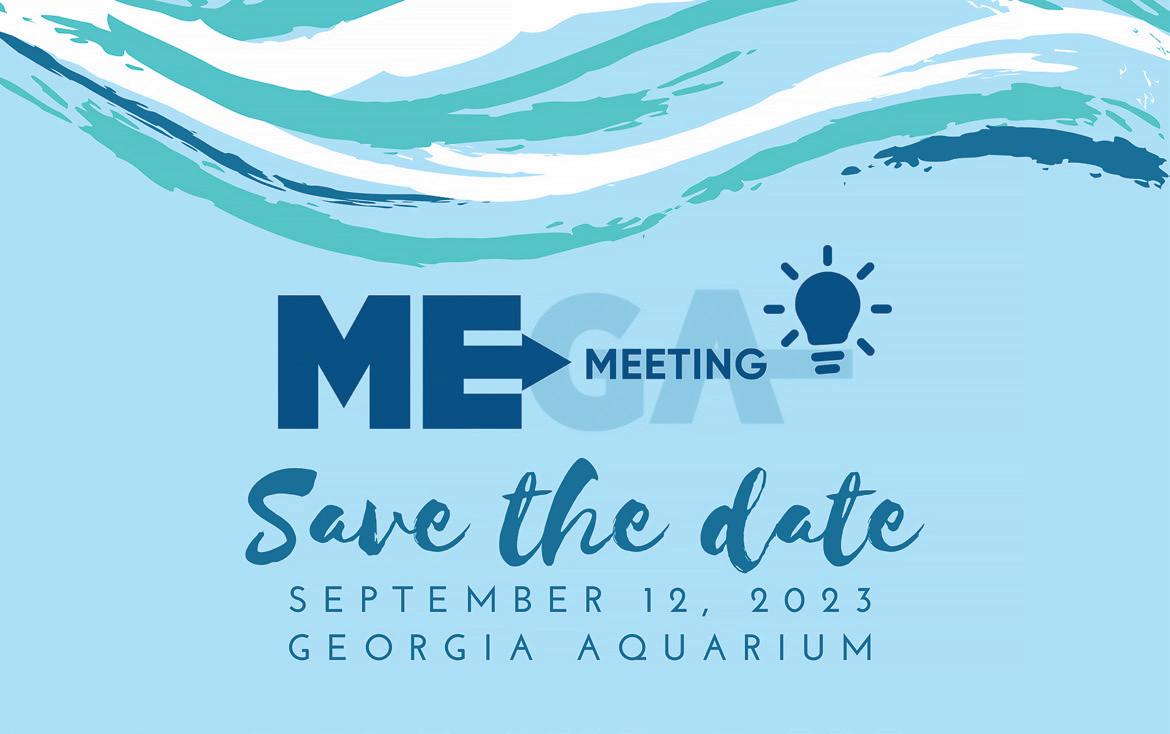
association [ news ] MICHELE REDMOND HOLCOMBE SMPS President Michele@foundationtechnologies.com www.smpsatl.org KEEP IN TOUCH smpsatl.org linkedin.com/company/smps-atlanta 2023 MEGA MEETING SEPTEMBER 12, 2023 | 10:30 AM – 1:30 AM GEORGIA AQUARIUM – OCEANS BALLROOM Contact: Angel Jones, CPSM – SLS Consulting Angel ajones@slsfire.com 64 Engineering Georgia
RUKIYA S. THOMAS
WTS Atlanta President
Rukiya.Thomas@atkinsglobal.com www.wtsinternational.org/atlanta
WTS Atlanta celebrated its annual 2023 GDOT Board Breakfast. Guest speakers included female members of the GDOT Board & Commissioner Russell McMurry. We were also joined by board members Jamie Boswell and Curt Thompson. Female board members Dana Lemon, Cathy Williams, Stacey Key, Emily Dunn and Ann Purcell engaged in a candid talk moderated by WTS Atlanta Chapter President, Rukiya Thomas. They shared their unique perspective and shared their wisdom as leading women in the industry. Commissioner McMurry provided inspirational words, a brief update on GDOT’s leadership team and the plans for the future of transportation in the State of Georgia.
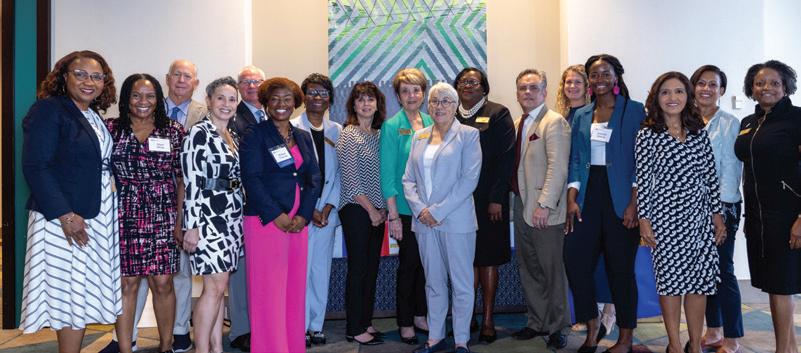

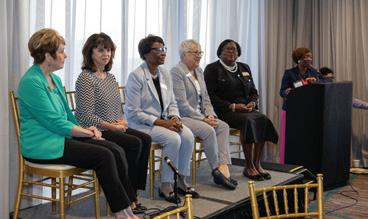
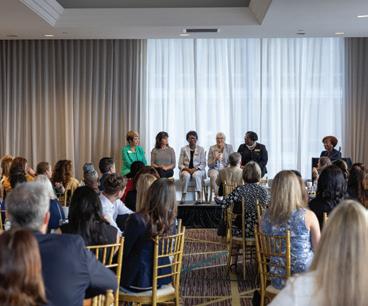
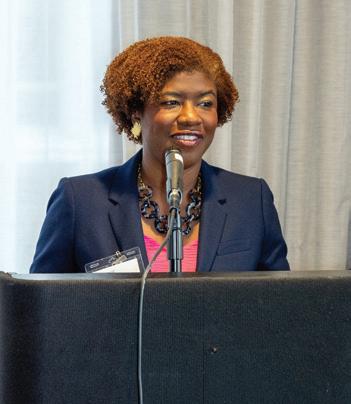
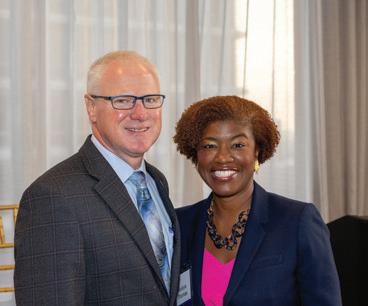
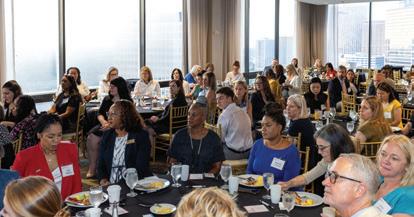
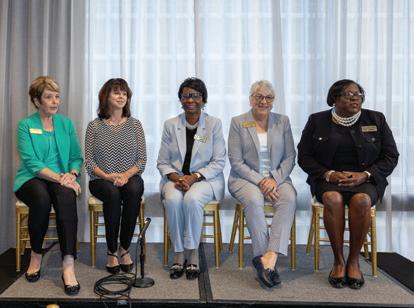
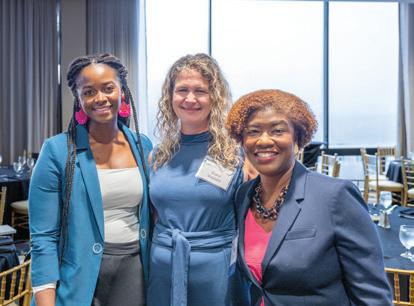
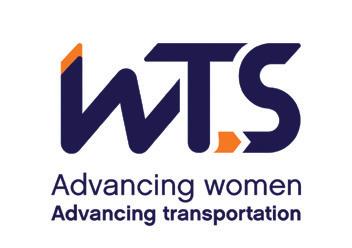
July | August 65 association [ news ]
A LOOK BACK
 Savannah, Georgia — Broughton Street illuminated by lights circa 1911. A jewelry store on Broughton Street was the first building in Savannah to have electric lights in the early 1890’s.
Savannah, Georgia — Broughton Street illuminated by lights circa 1911. A jewelry store on Broughton Street was the first building in Savannah to have electric lights in the early 1890’s.
66 Engineering Georgia
PHOTO CREDIT: Library of Congress
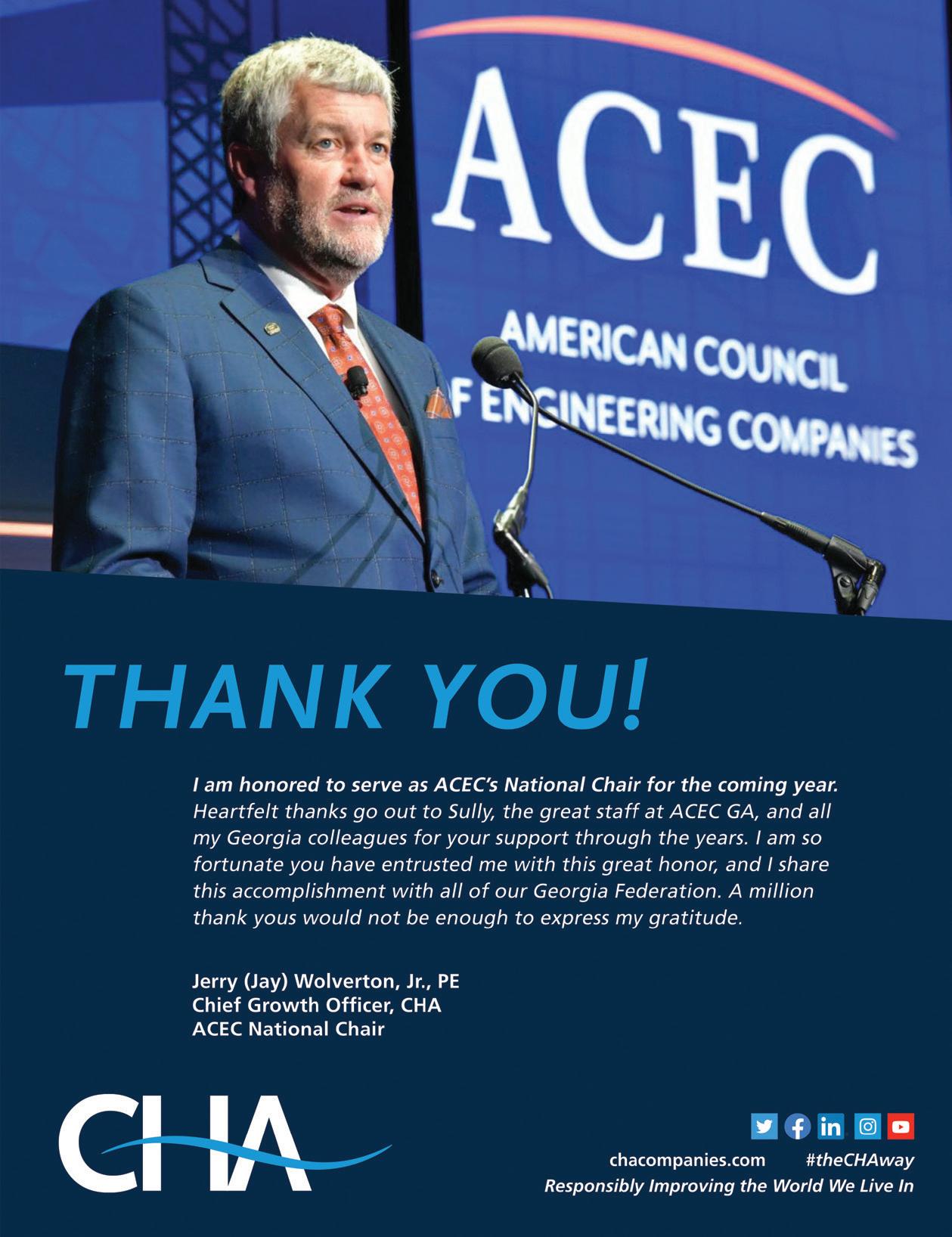































 Ali Elnaamani
Tracy Rye
Victor Miller
John Bolen
Andrew Mahfood
Justin Kanitz
Phillip (Phil) W. Stevens
Ali Elnaamani
Tracy Rye
Victor Miller
John Bolen
Andrew Mahfood
Justin Kanitz
Phillip (Phil) W. Stevens





















































 From left to right: Rakeem Jackson with Barge, Eddie Wade with Croy, Michael Kusch with Foley Products, and Joe Chevrier with ACPA
Kerry Kocur, VHB, speaking at the 2023 Summer Conference
Participants at the 2023 Georgia Engineers Summer Conference mingle and engage with exhibitors
ACEC Chairman Jay Wolverton and wife Ann Wolverton with FIDIC President Anthony Barry of Australia and FIDIC CEO Nelson Ogunshakin
Sasha Ugi with Croy and Holly Painter, ACEC Georgia Treasurer with KCI
Frank Lazaro, CERM, speaking at the 2023 Summer Conference
ACEC Chairman Jay Wolverton of CHA speaking after being sworn in as 2023-2024 ACEC National Chairman at the National Spring Conference
From left to right: Rakeem Jackson with Barge, Eddie Wade with Croy, Michael Kusch with Foley Products, and Joe Chevrier with ACPA
Kerry Kocur, VHB, speaking at the 2023 Summer Conference
Participants at the 2023 Georgia Engineers Summer Conference mingle and engage with exhibitors
ACEC Chairman Jay Wolverton and wife Ann Wolverton with FIDIC President Anthony Barry of Australia and FIDIC CEO Nelson Ogunshakin
Sasha Ugi with Croy and Holly Painter, ACEC Georgia Treasurer with KCI
Frank Lazaro, CERM, speaking at the 2023 Summer Conference
ACEC Chairman Jay Wolverton of CHA speaking after being sworn in as 2023-2024 ACEC National Chairman at the National Spring Conference
























 ACEC Georgia Junior Board member Hayley Carmack, Shivam Chandra with 2MNEXT, and Akyiaa Morrison with 2MNext
Participants at the 2023 Georgia Engineers Summer Conference engage in meaningful conversations at the Cornerstone Financial Hospitality Corner. (Rob Jacquette, Brittany Meek, Erik Grandowsky, and Keith & Susan Costley)
Denyel Garland, Sean Garland with Pont Engineering, Mae Whiteside Williams with CKL Engineers, and her husband Malcolm Williams
Participants of the 2023 Summer Conference enjoy the evening dessert reception
From left to right: Jeff Simmons with Platinum Geomatics, Chris Simmons, Tom Hurby with Luster National, Rebecca Hurby, Roger Guilian with the ACEC Business Insurance Trust, Lydia Zabrycki with the ACEC Retirement Trust, Julie Bertilis with Oldcastle Infrastructure, Cindy Jenkins with Jacobs, Rachel King with CKL Engineers, Warren Dimsdale with Heath & Lineback, Aaron McCullough with Hughes-Ray Company (behind Matt), Matt Calak with Heath & Lineback enjoy cider from Urban Orchard as part of the Summer Conference's optional fun activities.
Keynote Speaker Ben Sorensen speaking at the 2023 Summer Conference
Holly Painter and Bayne Smith with KCI
ACEC Georgia Junior Board member Hayley Carmack, Shivam Chandra with 2MNEXT, and Akyiaa Morrison with 2MNext
Participants at the 2023 Georgia Engineers Summer Conference engage in meaningful conversations at the Cornerstone Financial Hospitality Corner. (Rob Jacquette, Brittany Meek, Erik Grandowsky, and Keith & Susan Costley)
Denyel Garland, Sean Garland with Pont Engineering, Mae Whiteside Williams with CKL Engineers, and her husband Malcolm Williams
Participants of the 2023 Summer Conference enjoy the evening dessert reception
From left to right: Jeff Simmons with Platinum Geomatics, Chris Simmons, Tom Hurby with Luster National, Rebecca Hurby, Roger Guilian with the ACEC Business Insurance Trust, Lydia Zabrycki with the ACEC Retirement Trust, Julie Bertilis with Oldcastle Infrastructure, Cindy Jenkins with Jacobs, Rachel King with CKL Engineers, Warren Dimsdale with Heath & Lineback, Aaron McCullough with Hughes-Ray Company (behind Matt), Matt Calak with Heath & Lineback enjoy cider from Urban Orchard as part of the Summer Conference's optional fun activities.
Keynote Speaker Ben Sorensen speaking at the 2023 Summer Conference
Holly Painter and Bayne Smith with KCI














































































 PE, PTOE
PE, PTOE
 GEF President
GEF President































 Savannah, Georgia — Broughton Street illuminated by lights circa 1911. A jewelry store on Broughton Street was the first building in Savannah to have electric lights in the early 1890’s.
Savannah, Georgia — Broughton Street illuminated by lights circa 1911. A jewelry store on Broughton Street was the first building in Savannah to have electric lights in the early 1890’s.


